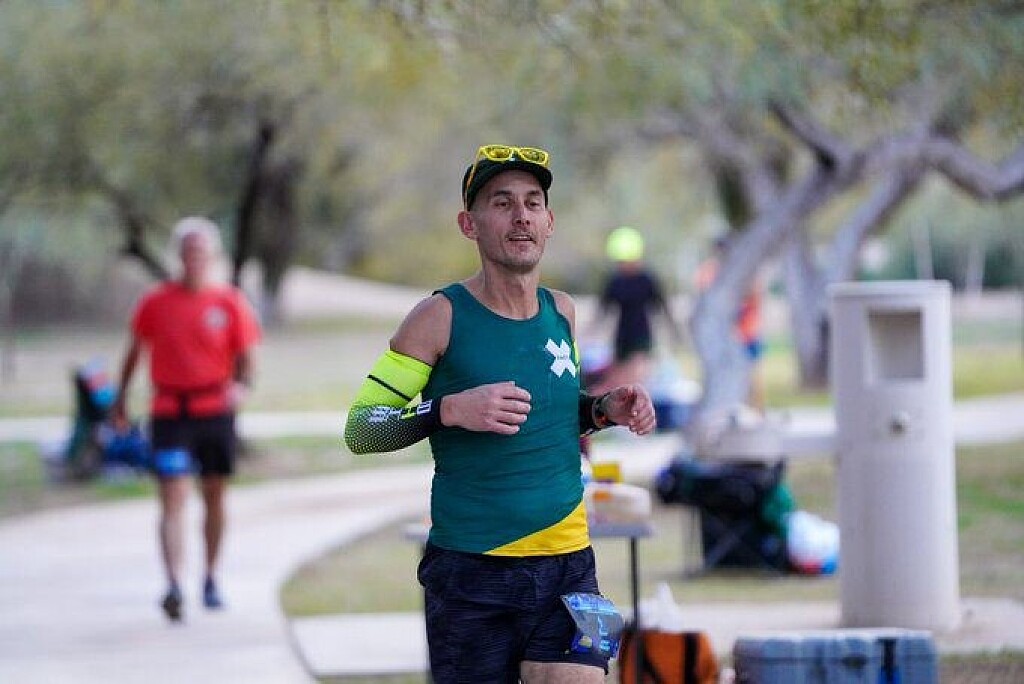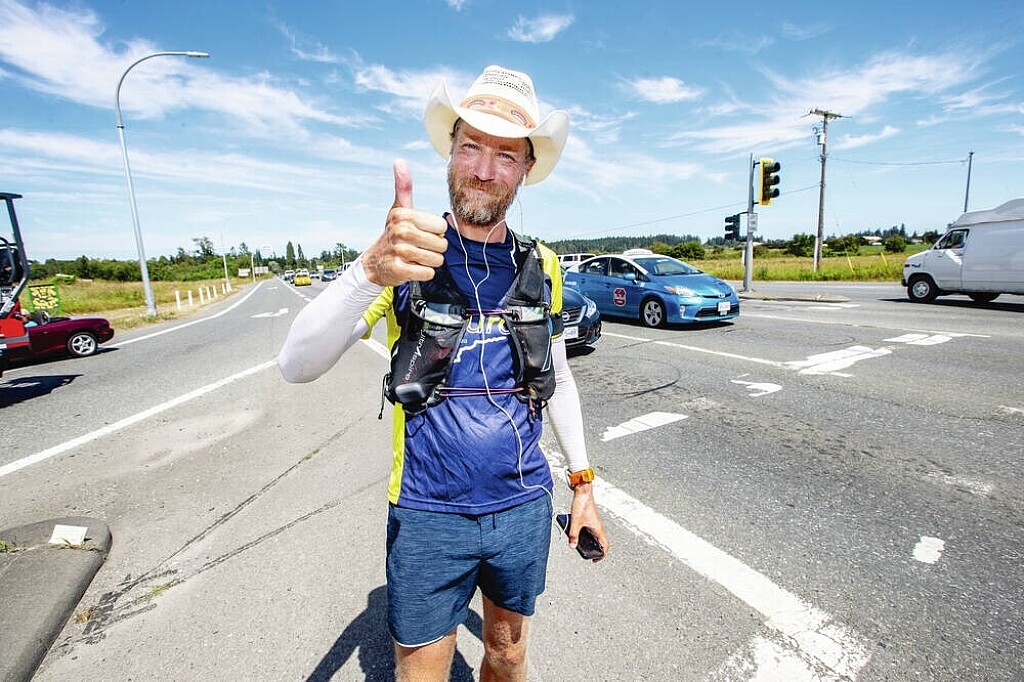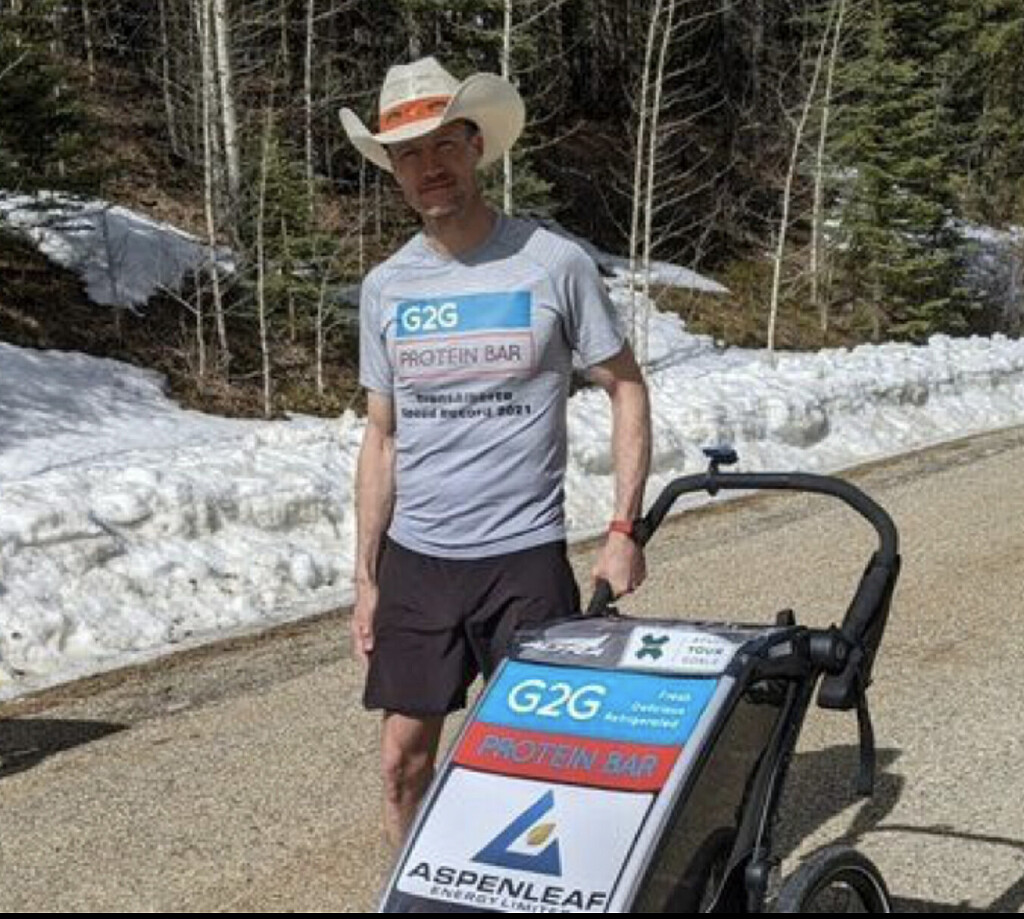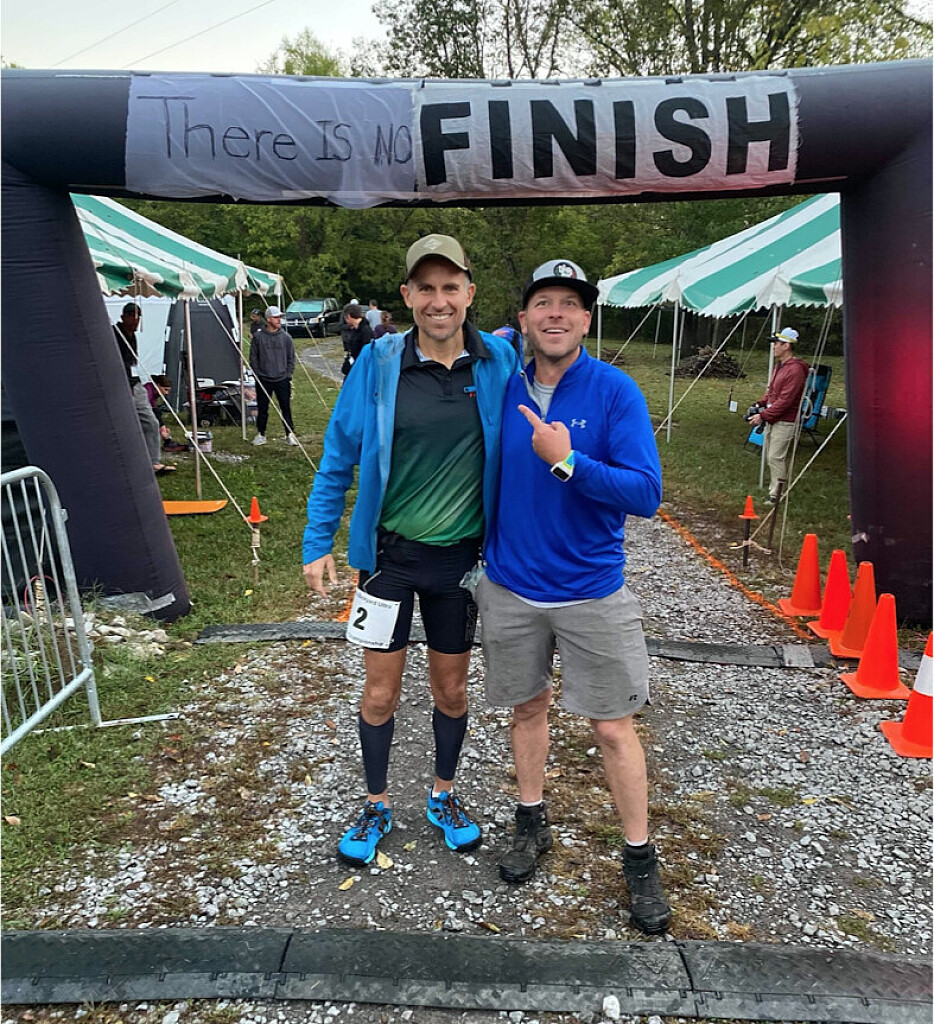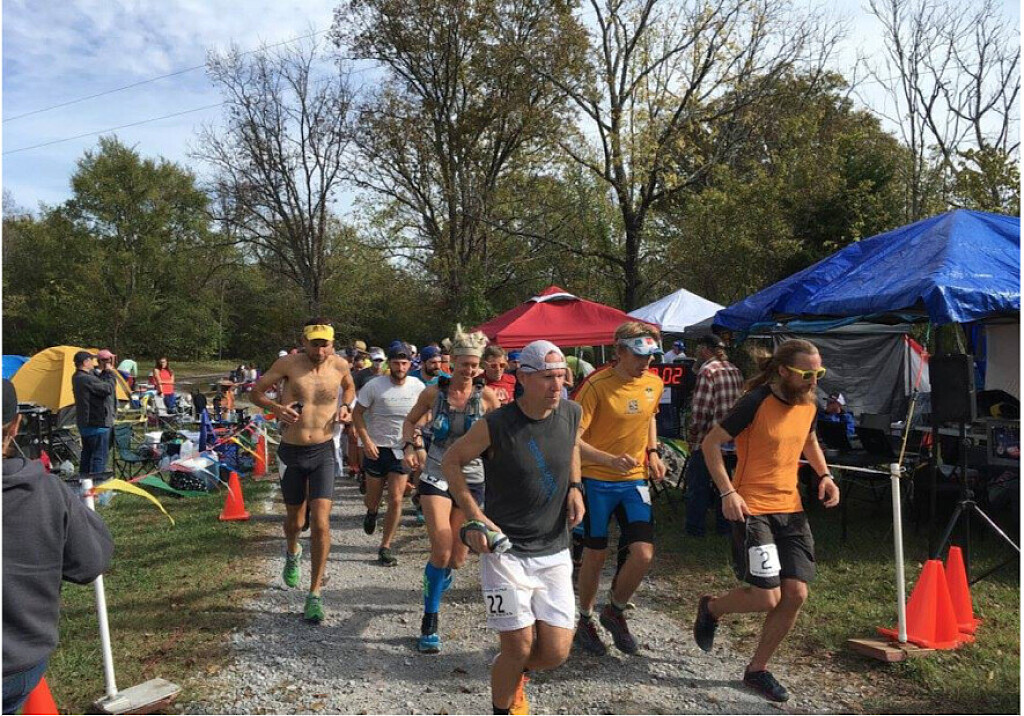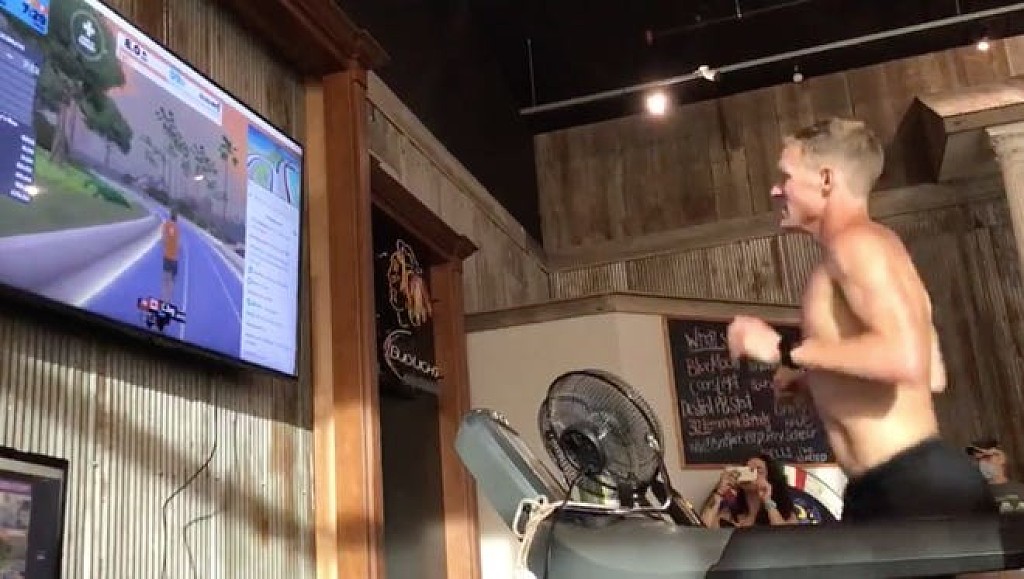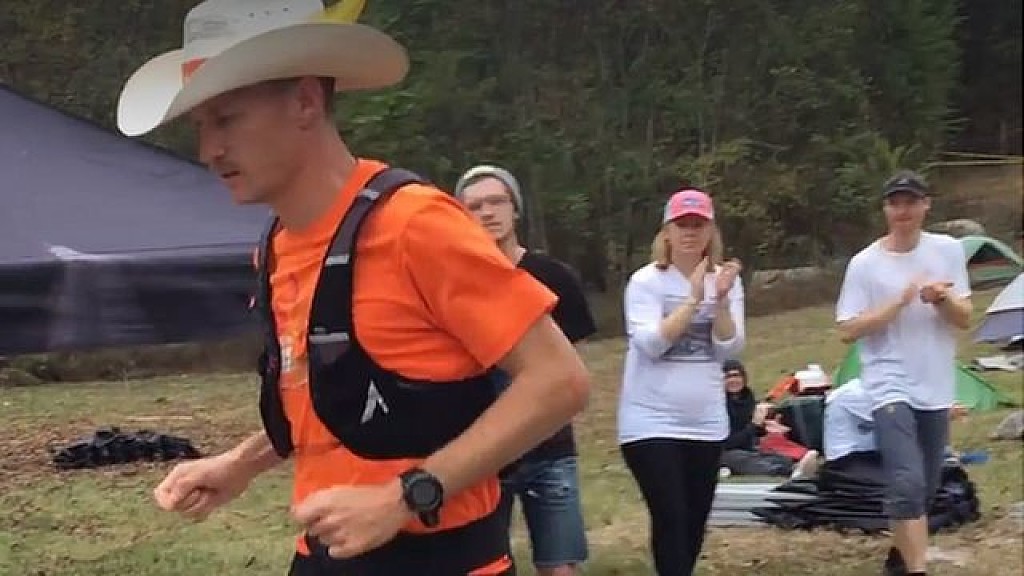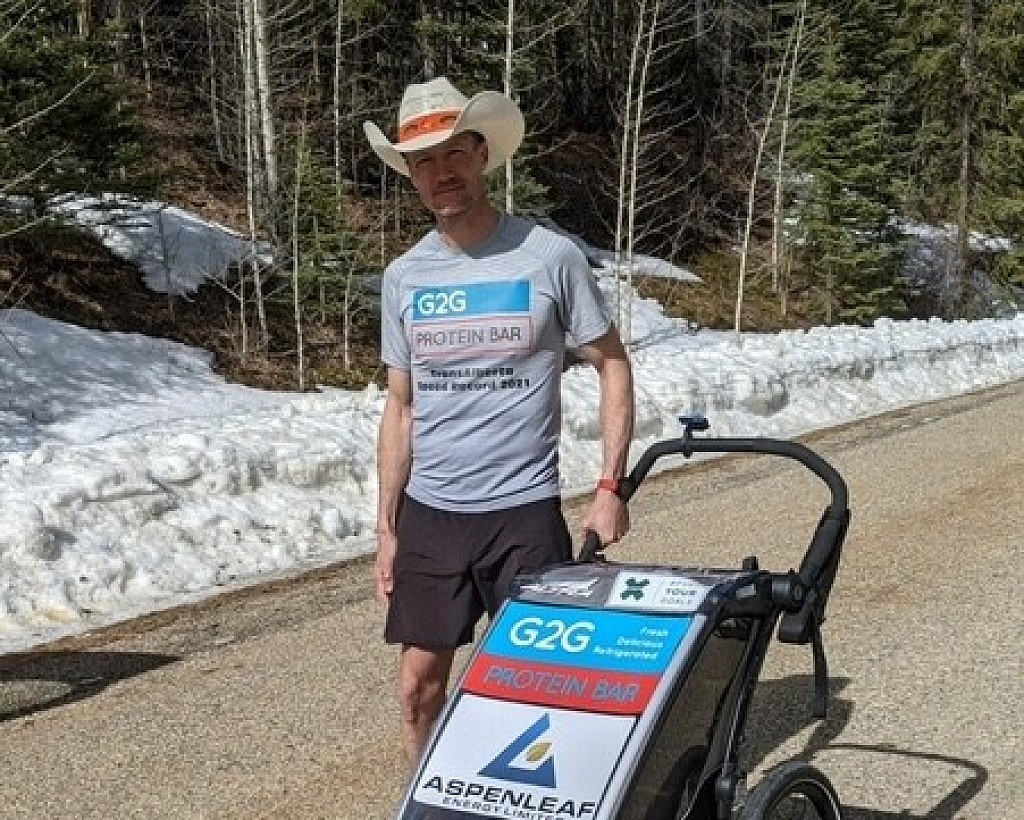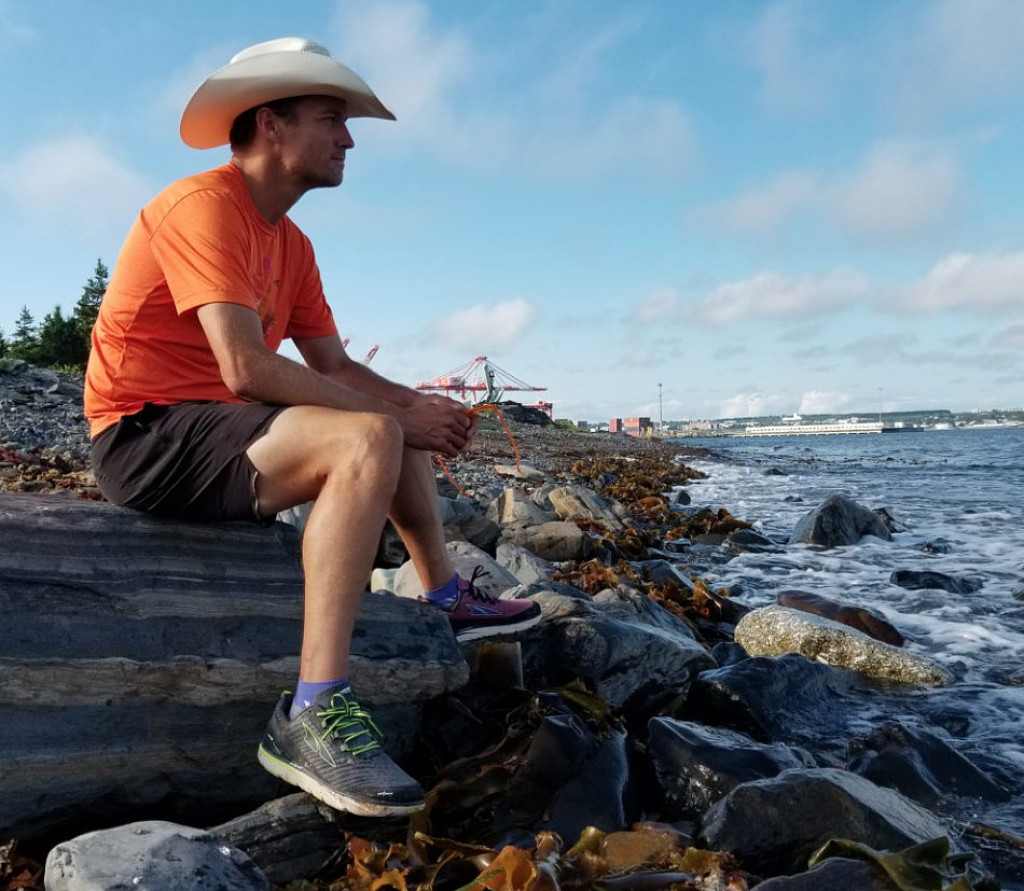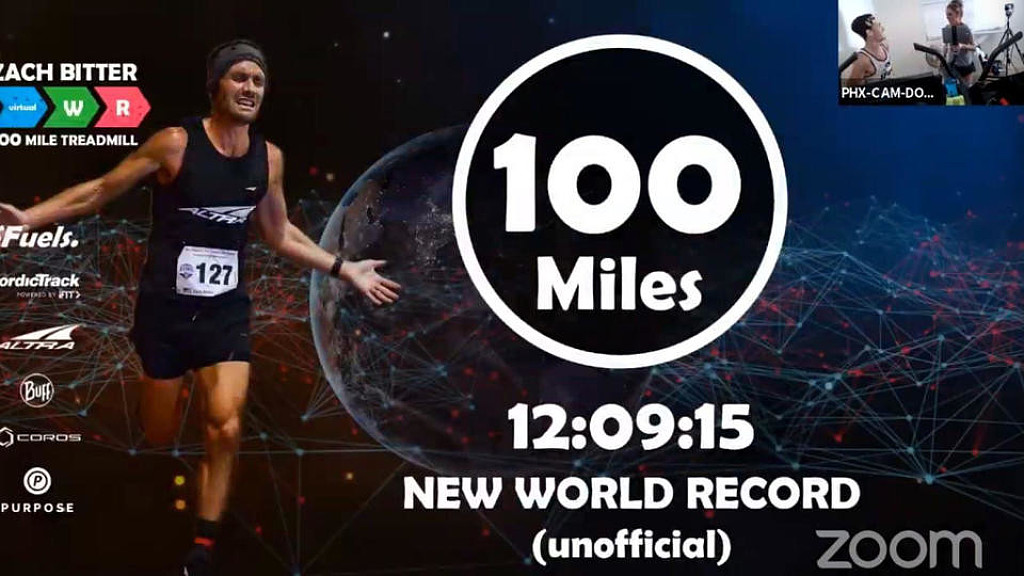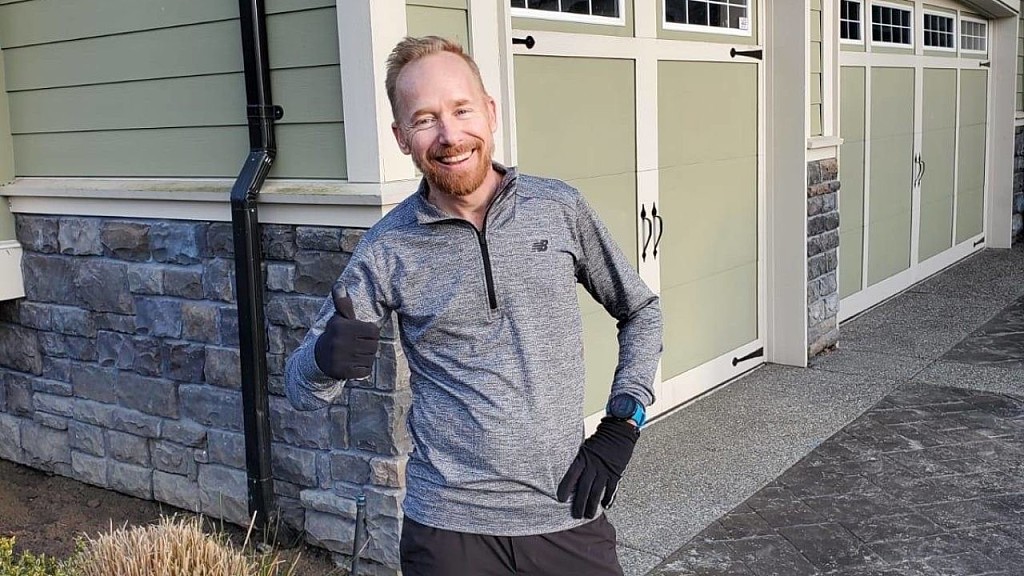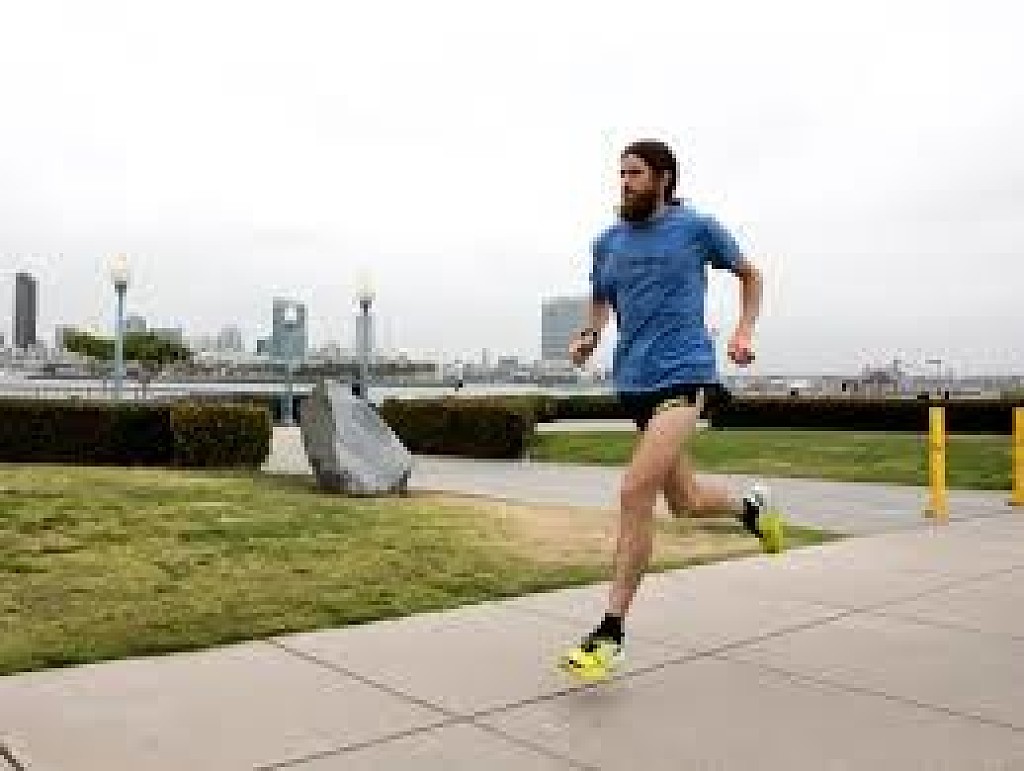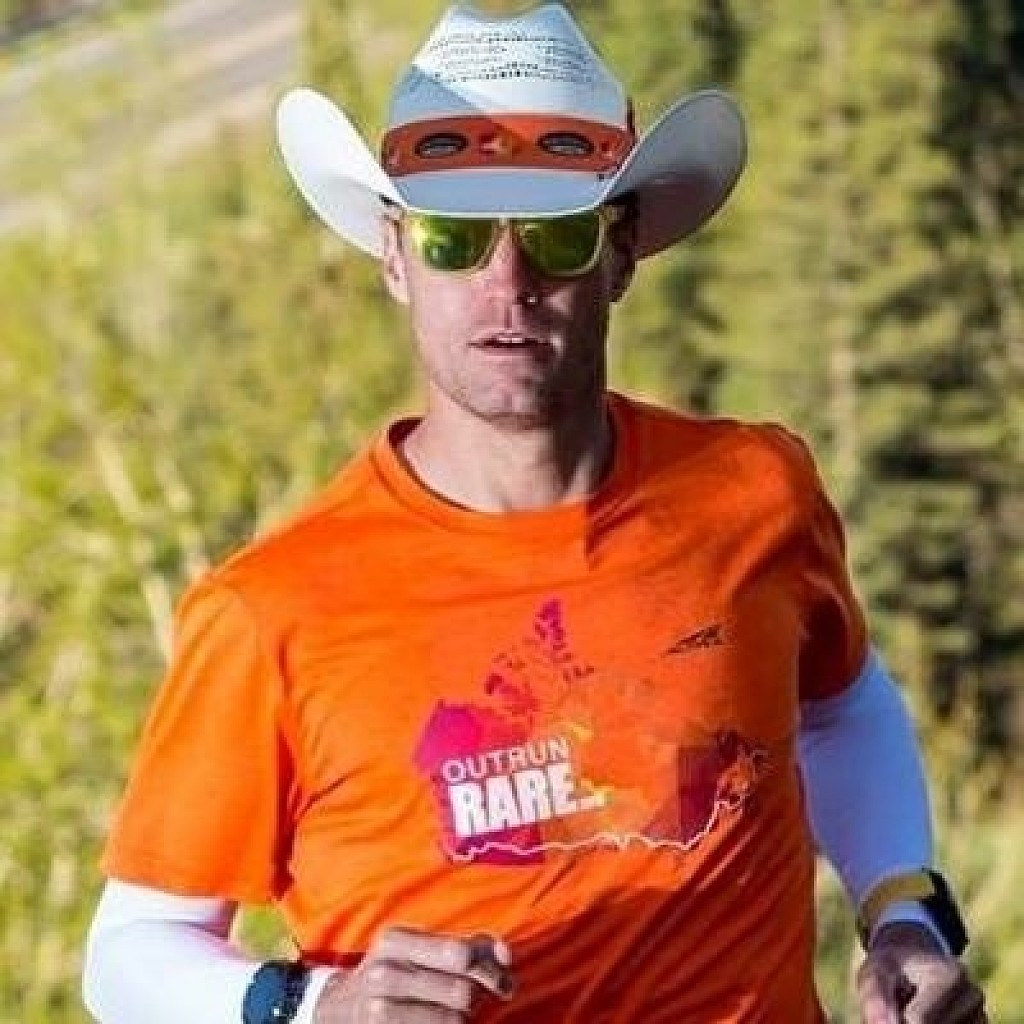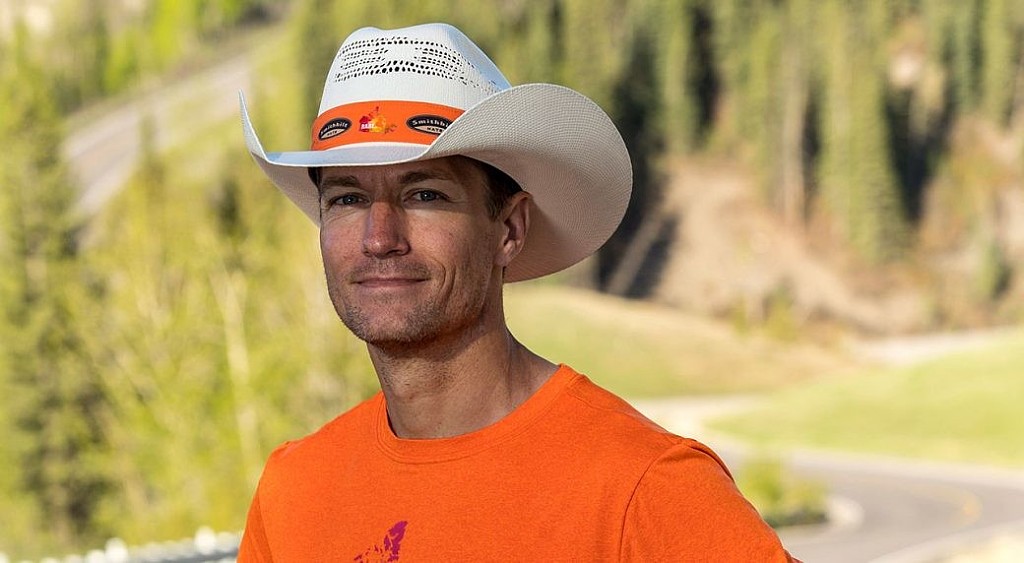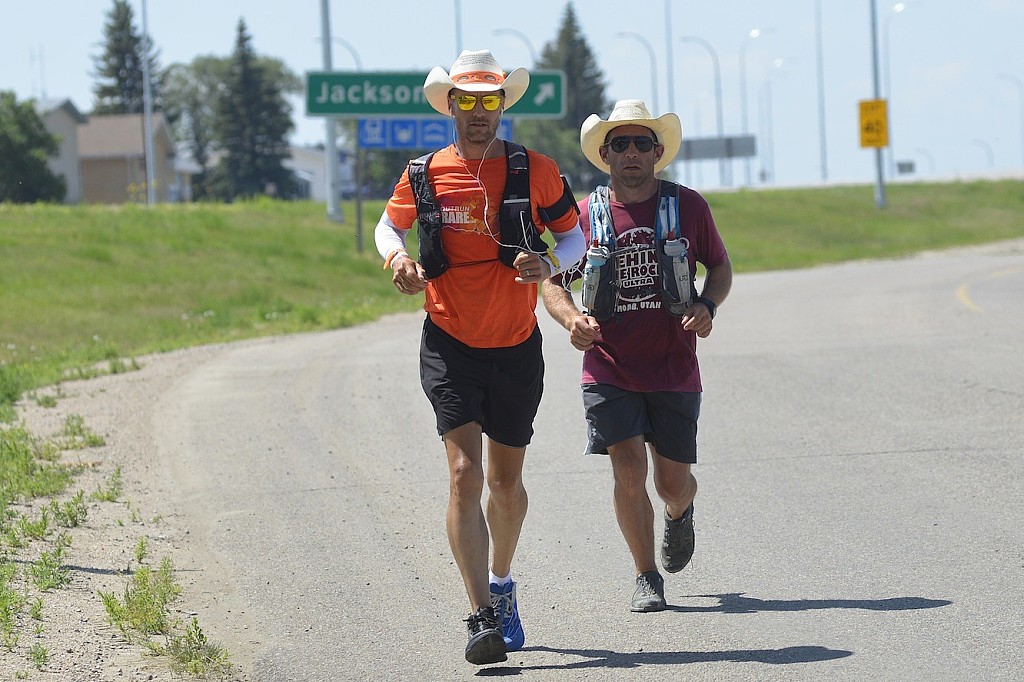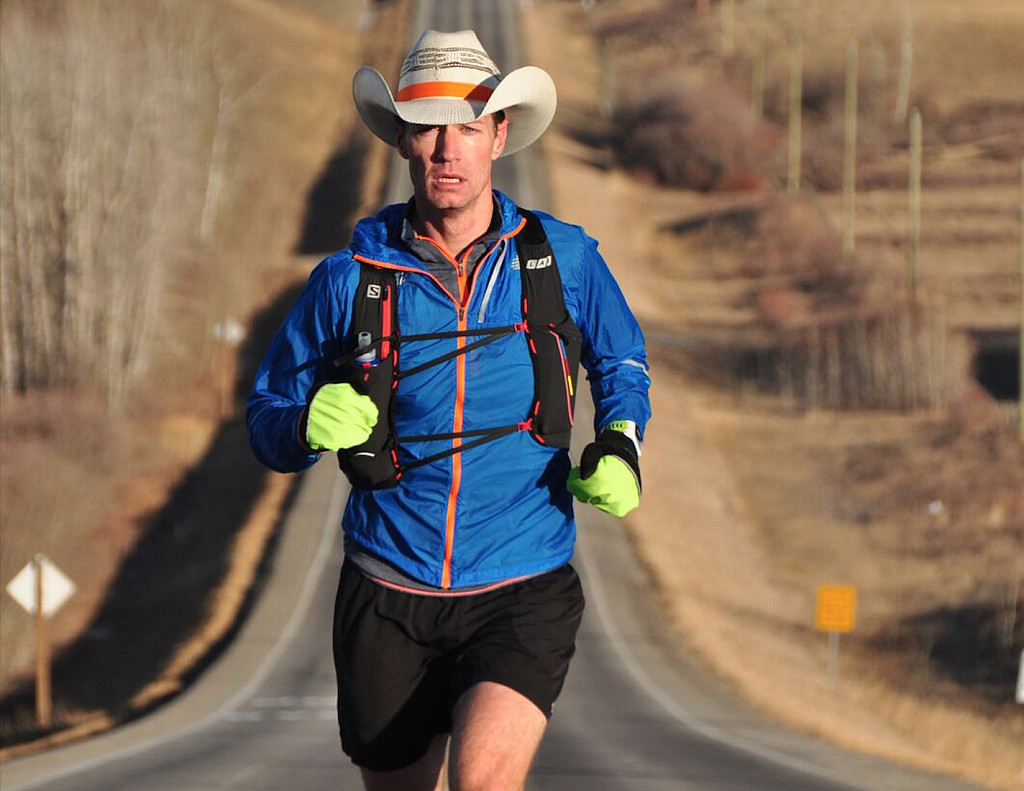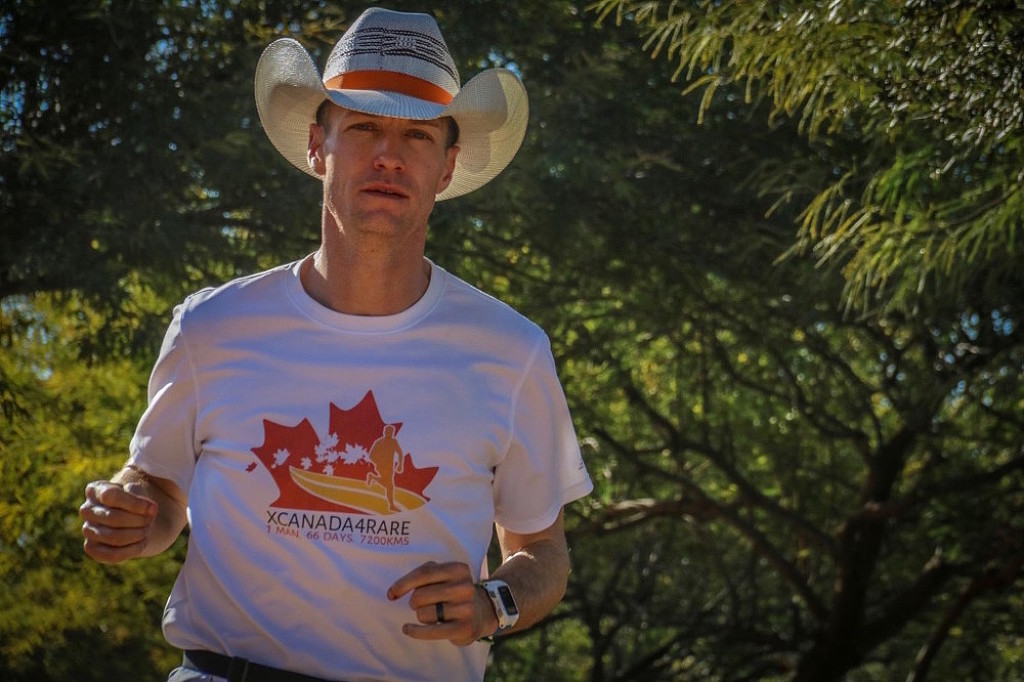Running News Daily
Running News Daily is edited by Bob Anderson. Send your news items to bob@mybestruns.com Advertising opportunities available. Train the Kenyan Way at KATA Kenya and Portugal owned and operated by Bob Anderson. Be sure to catch our movie A Long Run the movie KATA Running Camps and KATA Potato Farms - 31 now open in Kenya! https://kata.ke/
Index to Daily Posts · Sign Up For Updates · Run The World Feed
Articles tagged #Dave Proctor
Today's Running News
Jerry Hughes smashes Canadian 48-hour record
Victoria, B.C.’s Jerry Hughes set a new Canadian 48-hour record early Sunday morning at the Fat Ox Endurance Run in Arizona, running 368.031 kilometers (228.684 miles). Hughes boasts an extensive ultrarunning resume, but this is his first Canadian record, besting Dave Proctor’s 2018 record of 358.163 km (222 miles). Hughes headed into the event with a goal of qualifying for the Canadian 24hr team, a goal he nailed along the way. Hughes ran 221.01 km (137.33 miles) in 24 hours, more than any Canadian in 2022.
The Fat Ox Endurance Run (hosted by Aravaipa Running, known for endurance events like Javelina Jundred and Across the Years) was “originally founded as a research study on fat oxidation utilization for ultra runners,” ultrarunner and race director Jamil Coury explains. The race was in a new location this year, held on a 1590.3-meter concrete loop on an eight-foot-wide sidewalk winding through Estrella Mountain Regional Park, just outside of Phoenix, Ariz.
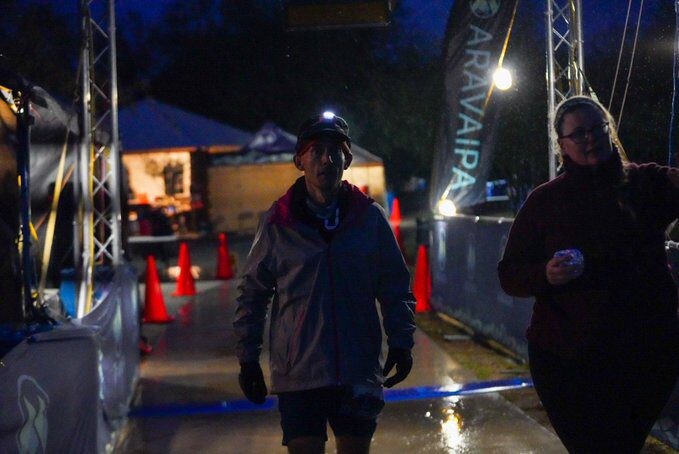
In its third year as a fixed-time race with multiple distances, the 48-hour event began Friday in ideal running conditions–cool and overcast skies. Saturday, however, was another story, with an increasing chance of rain evolving into a significant rainstorm that Coury says “parked itself across much of the state of Arizona and recorded a rainfall record for Sky Harbor airport.”
Despite the conditions, Hughes kept on moving. “Runners persisted throughout, including Jerry Hughes who really dug deep the last night running through off-and-on rain to not only set a new Canadian 48-hour record not only overtaking Dave Proctor but also landing on the top 10 all-time in North America,” says Coury.
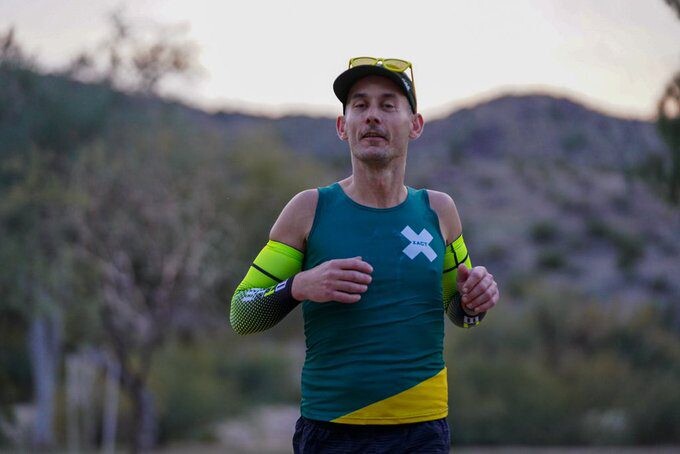
Hughes’s journey of resilience
Hughes started running in 2014 with a 10K race and says he was hooked after that. “A month later, I did my first half-marathon in 1:40,” he says. In 2015, he ran his first marathon in 3:11, and decided to make the leap to ultras, tackling the Squamish 50-miler in 2016. He upped his distance with his first 100-miler in California, where he bested his goal of running under 24 hours by a large margin, finishing in sixth place in a little over 18 hours.
“It was at this point that I realized I had a bit of a gift for this,” Hughes says. Since then, Hughes has been a regular on the ultra scene, racing everything from 100-milers to multi-day events. When COVID-19 shut down events, he reached out to friends Lisa Large and Josh Heath to organize the One Track Mind Ultra, a fundraiser for the Help Fill a Dream Foundation. The charity supported Hughes and his siblings (all of whom live with Gardner’s syndrome, a rare genetic disorder that can lead to colon cancer) when they were younger.
Hughes, a busy father of four young children, is known for being a positive force in the running community in Victoria and beyond, and for taking every opportunity he can find to give back. Fellow Canadian ultrarunner Matt Shepard ran with Hughes at One Track Mind Ultra, and says he was impressed by his resilience. “After hearing his story and the challenges that he has faced, I was blown away,” says Shepard.
“After realizing that he didn’t have to let his challenges define him, he started chasing these big goals to show others that they can also overcome seemingly impossible obstacles. Jerry shares so much love and inspiration,” said Shepard. “I am incredibly proud of him for his efforts and the lessons he is sharing with the world.”
While Hughes described the rainy, middle-of-the-night laps toward the end of his 48-hour run as “pure misery,” he was in great spirits Monday morning as he prepared to head back to Canada, joking that while he felt pretty good, he might need some assistance getting into the plane.
by Keeley Milne
Login to leave a comment
Dave Proctor ends his cross-Canada run in Victoria after 67 days
Right on schedule, Dave Proctor of Okotoks, Alta. wrapped up his cross-Canada record quest in Victoria late Thursday afternoon. Proctor completed his 7,159km run after 67 straight days of running, and (pending verification) will have topped Al Howie’s cross-Canada speed record of 72 days, 10 hours, set in 1991. Proctor began this record attempt with a hat dip in St. John’s, and has been steadily running around 105 kilometers a day across the country, bumping that distance up to 107 km over the last few days to be certain of hitting the target.
This was not Proctor’s first attempt at the record; in 2018, running in the other direction, he was beset by a back injury and forced to quit in Manitoba after 32 days on the road. He then had to put off making his record attempt due to COVID. He shared gratitude for the journey in a social media post Thursday evening, calling the experience “priceless.”

Proctor is one of Canada’s most accomplished and best known ultrarunners. He holds course records at races including Lethbridge, Alta.’s Lost Soul Ultra (where he ran the 100-miler in 2021 in 19:05:00, beating his own previous course record of 19:27:00); he set the 48-hour Canadian record at 6 Days in the Dome in 2018 (358.163 km); in addition, he holds Canadian records over 24 hours (257.093 km) and 72 hours (500.077 km).
Proctor shared daily posts on Instagram that included his mileage, a ‘ditch find’ of the day, and his daily progress. In a recent post thanking the watch brand Coros for their sponsorship, he mentioned that he would be making his COROS data available post-run, but warned, “they’ll be big files.”
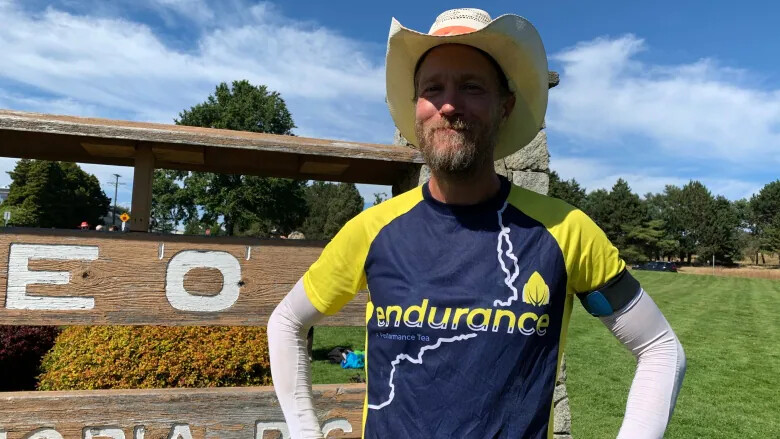
American ultrarunner Pete Kostelnick is familiar with a journey like Proctor’s: he holds the trans-American speed record of 42 days, 6 hours, 30 minutes. Kostelnick spoke to Proctor on Thursday during the final leg of his run, and shared some insight into how he is probably feeling right now.
“It’s bittersweet, but mostly sweet. After over two months, Dave’s new normal is very simple–eat, run, rest, repeat. Soon he’ll be back to ‘normal’ life, which, quite honestly, is a shock to the body and mind. In something like this, I think also a lot of the reward comes while you’re doing it,” Kostelnick said. “It’s a powerful feeling to know you just ran another 105 km yesterday, today and will keep doing it day after day. Once you’ve done it, you have so much to celebrate and be thankful for, but part of you is also thinking “well, what now?” My best advice to him today was to spend some time running alone and reflecting on the whole experience as he nears the finish line.”
Proctor was joined across the country by various friends, family members and fellow ultrarunners, who crewed and logged kilometres with him for anywhere from six days to over two weeks. Calgary-based ultrarunner Joel Campbell spent nine days with him, and has also paced him at local races. He feels Proctor’s strongest ability is his mental stamina.
“[It] is what puts him on the shortlist of elite multi-day runners out there,” Campbell says. “A lot of it has to do with his courage and the willingness to put himself on the line for failure, and high-profile public failure at that. Scrolling through the comments on his social media posts, I’m struck by how many people mention their own running triumphs, but more often, their missed attempts. Most of us have bonked in a race at some point, and to see him be willing to try again and now achieve his goal, seems to inspire others in whatever pursuits they’re facing.”
Kostelnick agrees: “He’s stubborn! This accomplishment for him has been in the making for years, and there were so many times when almost anyone but Dave would have said ‘well, maybe it’s not for me. Time to move on.'” Proctor faced both mental and physical challenges on the road and shared some of them with his fans on social media, including his struggle with not seeing his kids for so long and the physically painful start to each day.
Proctor touted both Howie and Terry Fox as inspiration on the road, sharing his thoughts on day 39 as he ran on the stretch of highway where Fox was forced to end his own trans-Canada run: “On this road, on this day I was schooled in the lessons of courage, determination, and belief that I thought I understood prior to this run but now know that I knew nothing.”
Proctor’s partner, Lana Ledene, shared her perspective on social media Wednesday evening. She wrote about watching Proctor log miles seemingly without effort, and the immense suffering and exhaustion she witnessed at the end of each day. Ledene asked Proctor how he managed to keep going: “He said he doesn’t think about the pain, he blocks it out and does not allow it to occupy any space in his thoughts.” She adds: “Without a doubt, Dave’s superpower is not his legs, it’s his mind.”
Post-run Thursday, Proctor shared that he was looking forward to coffee in bed, and added: “I’ll be taking tomorrow off running.”
by Keeley Milne
Login to leave a comment
Four different ultrarunners are running across North America
Many runners have felt the silent pull of the long run, but running all day, every day, for months, takes the meaning of “long run” a step further. The passion for these gigantic physical and mental journeys seems only to be growing within the ultrarunning community, and we are aware of at least four ultrarunners (two Americans, one Canadian and one Irish) who are currently (or soon will be) crossing North America on foot–each for different reasons and causes.
Pete Kostelnick of Phoenix, Ariz. is known for breaking the trans-American record in 2016 by crossing the U.S. on foot in a record 42 days, six hours and 30 minutes. He followed that up in 2018 by completing a self-supported 8,614 km run from Kenai, Alaska, to Key West, Fla., including portions of western Canada, in 98 days. In July, he’ll begin an attempt to not only run 50 miles per day in 50 states over 50 days straight, solo, but he will then to head to Australia to become the first human to run the 3,935 km from Perth to Sydney, averaging roughly 128 kilometres per day for 31 days.
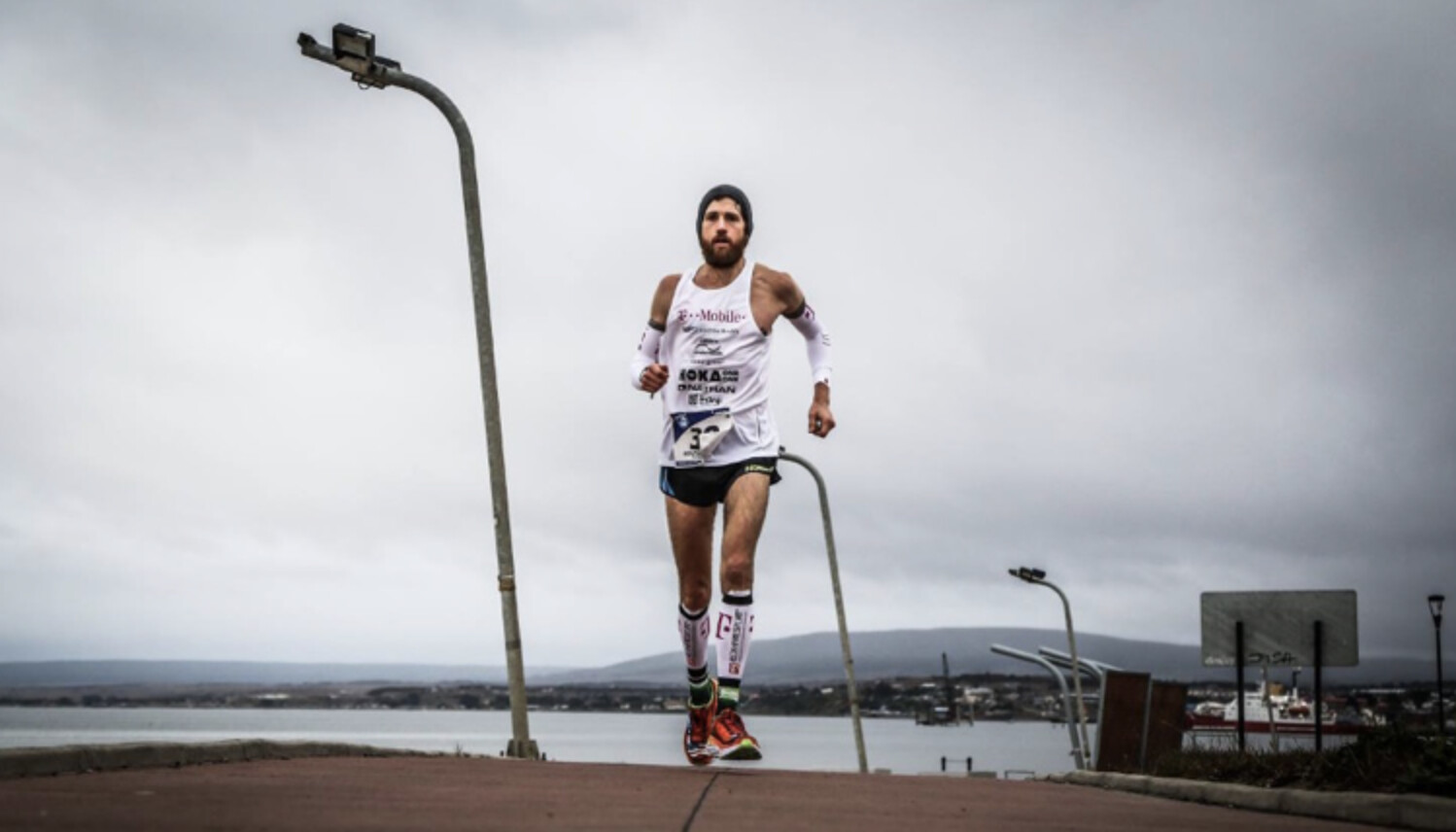
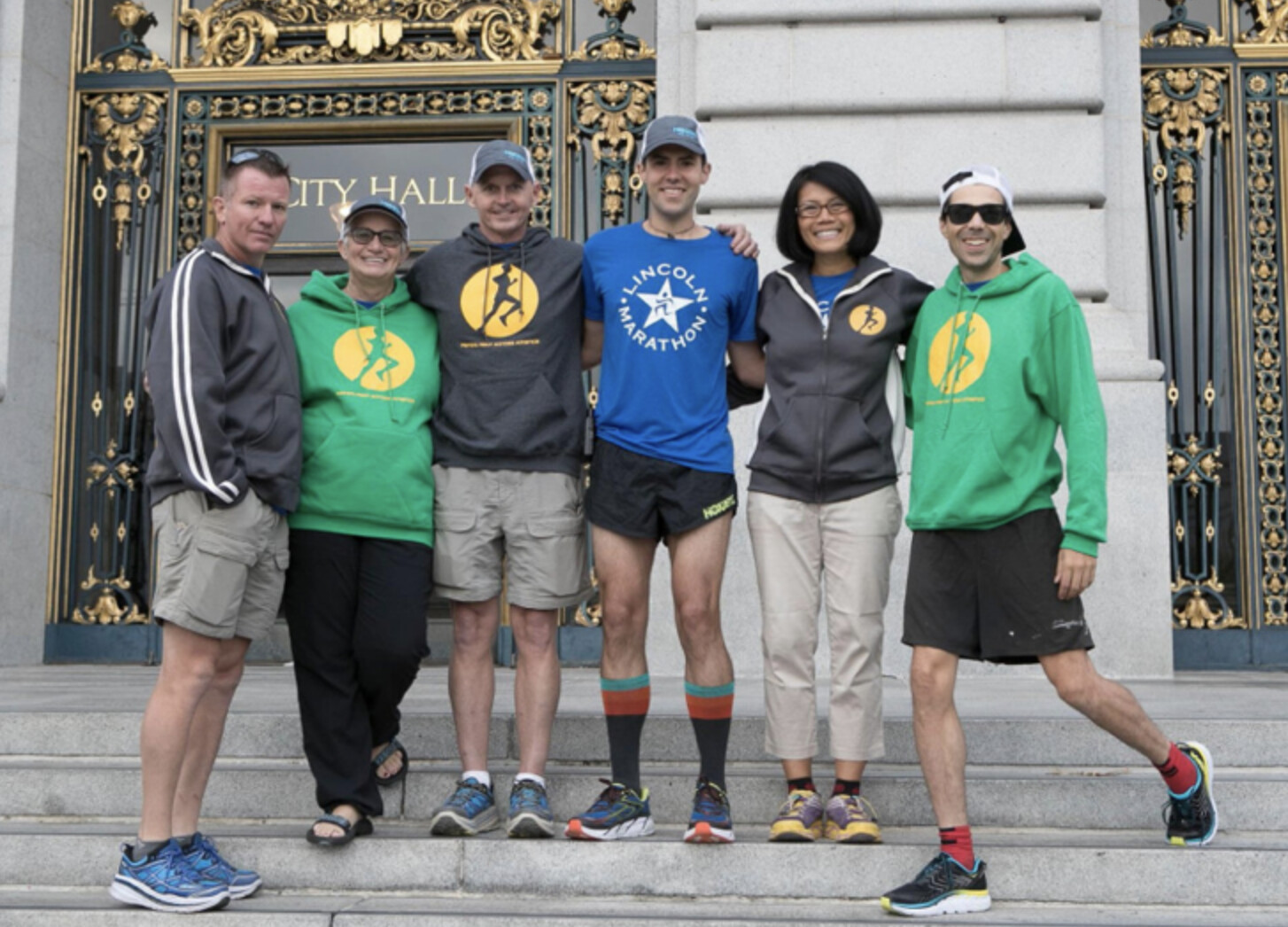
Kostelnick, 35, writes about the Australian adventure: “In running from Perth to Sydney in the bar I’ve set for myself, that will be the most difficult and challenging one I’ll probably ever attempt.” Kostelnick will host a daily podcast throughout his journey, and invites fellow runners to join him throughout his cross-U.S. run, with his expected dates of arrival in various places posted on social media.
Fellow Hoka-sponsored athlete and ultrarunner Mike Wardian of Arlington, Va., has already begun his trek across the U.S., one the athlete says he’s dreamed of for much of his life. Wardian is currently on day 19 of the 5,100 km journey, averaging 80 km per day and supported by his father, Richard Wardian. His daily updates online include what music or book he is listening to (yesterday was Guns and Roses), among other things. Wardian is raising money for World Vision in an attempt to provide greater access to clean drinking water to people across the world, in a project he has dubbed #runninghome.
Canadian Dave Proctor of Okotoks, Alta., is making his second attempt at breaking the cross-Canada record set by Al Howie in 1991. Howie ran from Newfoundland to Victoria in 72 days, 10 hours; following in Howie’s footsteps from east to west, Proctor hopes to complete the trek in 66 days. Proctor’s previous attempt in 2018 ended in injury, and his second attempt has been delayed by the pandemic. Currently on day five, Proctor is averaging 105 km a day and is supported by a varied crew of friends (including Canadian ultrarunners Matt Shepard, Mike Huber and Myron Tetrault, among others) and family, who are flying out separately to various points on his trip and providing aid for six to 16 days each.
Irish ultrarunner Richard Donovan, creator of the World Marathon Challenge (seven marathons on seven continents in seven days), is also running across the U.S., from east to west, in memory of his friend Alvin Matthews. Donovan’s run began the day after the Boston Marathon (which he also ran). He hopes to average about 64 km per day in a scenic and circuitous journey that will take about three months; he made a similar trek in 2015.
All four athletes have demonstrated remarkable prowess at ultra-distance events, and readers and runners alike look forward to both following the athletes online and spotting them on highways on multiple continents over the next few months.
by Running Magazine
Login to leave a comment
Harvey Lewis Breaks the Big’s Backyard Ultra Record By Running More Than 350 Miles in 85 Hours
He ran a 4.1667-mile loop every hour for 85 hours.
The third time was the charm for Ohio’s Harvey Lewis at the 2021 Big’s Backyard Ultra. After finishing as the assist in 2017 and 2020 (meaning, he is the second-to-last runner left in the race), the 45-year-old was finally the last runner standing in Bell Buckle, Tennessee. In total, Lewis ran 350.0028 miles in 85 hours/laps, making him the undisputed backyard ultra world-record holder.
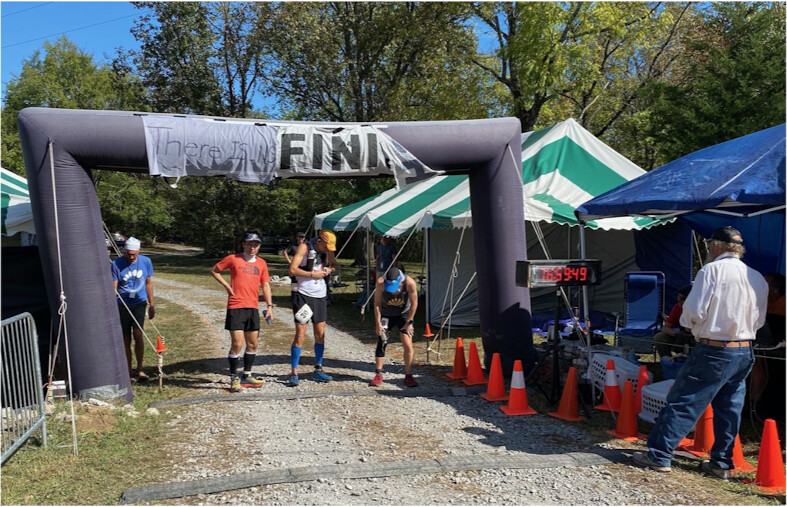
The backyard racing format has grown in popularity recently, with pop-up races happening all over the world. The rules, put simply, are: run a 4.167-mile loop at the top of every hour until one runner has done at least one more lap than the second-to-last runner. If both runners stop at the same time, then no winner is declared. At Big’s, runners complete a trail loop during the day, and a road loop at night.
The 2020 race was a virtual event, with runners in more than 20 countries competing simultaneously in standalone races. As a result, the 2021 race was anticipated to be one of the most stacked fields in race history. While some international runners were still unable to make the trip due to pandemic-related travel restrictions and concerns, several top runners made it to the start line. This included 2019 champion Maggie Guterl, 2020 champion Courtney Dauwalter, Big’s regular Dave Proctor, Michael Wardian, and Steve Slaby.
The race started at 6 a.m. ET on Saturday, October 16, and only three runners of 35 starters total dropped out within the first 24 hours (100 miles). But after that, runners seemed to drop almost every hour. Nine completed 48 hours, a large pack for reaching the third day of the race.
Lewis’s Big’s experience paid off as he and his crew chief Judd Poindexter troubleshooted any issues that arose. He fueled well and got five- to 10-minute naps when he could during the night, a big change from not sleeping at all in 2017.
One the race hit the 72-hour mark, it headed into uncharted territory with just three runners still standing: Lewis, Missouri’s Chris Roberts, and Japan’s Treumuchi “Mori” Morishita. Only two known backyard races in the world have hit the fabled fourth day before. This was the first time it had ever happened at Big’s.
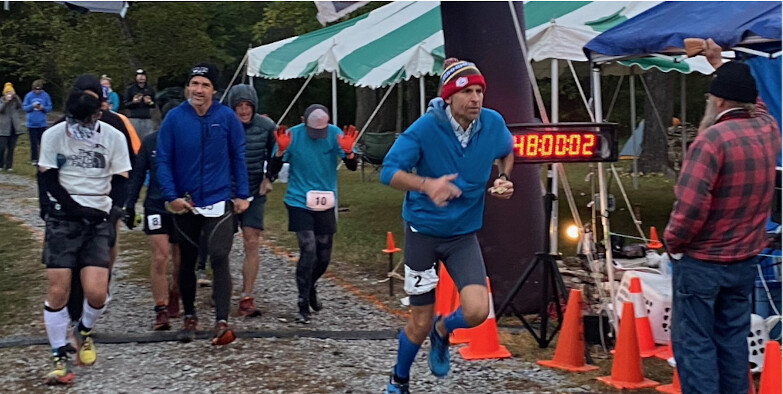
“We all wanted it so bad,” Lewis told Runner’s World. “We had lasted so long out there, which takes incredible willpower. It definitely helped. I wouldn’t have been out there without a reason to keep going, so I really enjoyed the challenge of running with them for so long together.”
The trio battled from lap 63 on, all quietly competing against one another. Each runner had their own style; Lewis and Morishita would sprint out of the corral at the start of some laps, which was a fan favorite.
“At the start and in certain areas, we just started sprinting,” Lewis said. “Morishita would sprint through the woods and yell, and then I would sprint through the woods and yell. It was a good move, so I hope Morishita didn’t mind I was doing it as well.”
Roberts struggled a lot before dawn, fighting off an injury that had him leaning sideways and coming in with few minutes to spare on laps. But as the sun rose, he recovered for a strong day.
Issues arose late in the game for Lewis and Morishita. Both runners fell on lap 81, which caused Morishita to miss the cutoff by 30 seconds, ending his day and leaving just Lewis and Roberts in the race. Lewis fell on the final hill and left him with an unknown (at the time) hand injury. Because his legs were okay, he ignored it and kept moving.
“As we got to the night, I thought for sure we’d be going to 400 [miles], so I mentally prepared myself for that,” Lewis said.
Many anticipated another complete night—that is, until lap 85, when Roberts surprisingly returned to camp soon after starting. Lewis, still on his loop, didn’t know this. Even though he didn’t see Roberts on the way back, he still wasn’t convinced he won until he got back to camp.
There, Lewis was greeted to roaring applause from the crowd that was still there. Lewis was finally a Big’s champion, capping off an incredible year of winning three major races: Badwater 135, Ohio’s Backyard Ultra, and now Big’s. He also earned the undisputed world record for most yards ever completed in a backyard race, taking the title from John Stocker who ran 81 yards with his assist, Matt Blackburn at the Suffolk Backyard Ultra in June 2021.
“It was an incredible experience,” Lewis said. “It has been one of my dreams to win this race, and to have it come to fruition was pretty mind-blowing for sure. I was super psyched.”
Lewis was so overcome with joy and exhaustion that he spent little time enjoying his win, opting to head to his tent shortly after finishing.
“When I finished, whatever armor I developed in my mind that told me I wasn’t going to submit went away,” he said. “I was really tired. I didn’t care where I slept. There was a cot in my tent 40 meters away, and it felt like the Taj Mahal. I fell asleep with half a plate of rice and beans on me.”
The next day, Lewis got a ride back to Cincinnati. When he arrived around 11 p.m., he kept his run streak alive by getting a mile in with minutes to spare. Then, a friend instructed him to go get his hand checked out in the emergency room after midnight. Harvey was diagnosed with a clean break in the fourth metacarpal of his right hand, and he was told should heal in a few weeks with just a splint.
Lewis told Runner’s World that he got a few hours of sleep in the ER before going home briefly and run commuting to work—he’s a social studies teacher at School for Creative and Performing Arts. Lewis wasn’t supposed to work because he had taken the day off. However, because of a shortage of substitute teachers at the moment, he literally ran in teach anyways.
“A couple times a year, I’ll take off to recuperate,” he said. “As long as I’m not hurting myself, I do the commute with human power.”
Big’s is likely the last race of the year for Lewis, though he plans to run the Flying Pig Marathon easy on October 30. His next big adventure will be the Barkley Marathons in 2022, which he now has entry to because of his Big’s win. Cantrell let Lewis know his thoughts on that.
“My biggest memory was turning to [Big’s and Barkley Marathons creator Gary ‘Lazarus Lake’ Cantrell] at the end and saying, ‘The winner gets an entry to Barkleys,’” Lewis said. “He couldn’t say no, so he went along with it. The next day, he told me that I’d be the sacrificial lamb.”
by Runner’s World
Login to leave a comment
Big's Backyard Ultra World Championship has begun
Big’s Backyard Ultra World Championships, Laz Lake’s infamous last-person-standing ultra, started at 7 a.m. Central this morning in Bell Buckle, Tenn. with 36 runners from 10 countries qualified at backyard races around the world to toe the line today. Watch for Canadians Dave Proctor, Stephanie Simpson, Matt Shepard, Eric Deshaies and Terri Biloski, with the action likely to continue until Monday.
The rules are simple: the course is a 4.1667-mile (6.7 km) trail loop (a.k.a. yard), which switches to a road loop at night. (The rationale for the length of the loop is that using this formula, 100 miles takes exactly 24 hours.) A new yard starts every hour on the hour. Runners must complete each loop under the one-hour cutoff and be ready on the start line for the next yard. A warning whistle is blown at three, two and one minute before the cutoff. If you fail to finish before the hour is up, it’s a DNF. If you fail to start (and make forward progress) at the top of the next hour, that’s a DNF. This continues until only one runner is left.
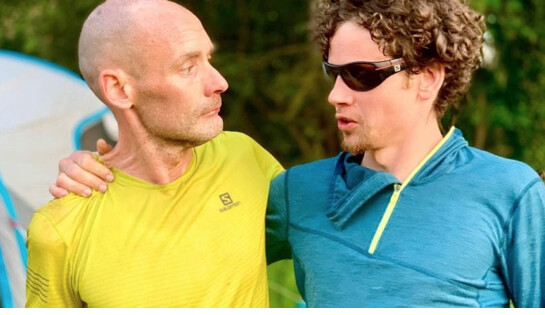
In the early hours of the race, most runners have time to spare after finishing each yard, and they use this time to refuel, use the bathroom, tweak their gear and rest. As the hours wear on and their pace gets slower, they have less and less time before lining up for the next yard.
As the race goes on and fatigue sets in, the dilemma becomes, where is the sweet spot between expending as little energy as possible while maximizing rest time between yards? In other words, the faster you complete the yard, the more rest time you get before the next yard – but you also fatigue more quickly.
This year’s starting list
This year’s competitors include seven women, two of whom are former Big’s champions Courtney Dauwalter and Maggie Guterl. Courtney holds the record for the most yards run at the Big’s course in Tennessee (68). The world record for the backyard format was set by John Stocker of the U.K. in June 2021, with 81 yards, eclipsing Karel Sabbe’s previous WR of 75 yards, set at last year’s Big’s world championships, on his home course in Belgium.
Here are this year’s contenders, with their country, age and qualifying number of yards. (Unfortunately, due to travel restrictions, most runners from Europe were not able to participate this year.)
Courtney Dauwalter, USA, 36 (68 yards – i.e., 455.6 kilometres over 68 hours)
Harvey Lewis, USA, 45 (67 yards)
Gavin Woody, USA, 44 (64 yards)
Michael Wardian, USA, 47 (63 yards)
Maggie Guterl, USA, 41 (60 yards)
Amy Masner, Ireland, 47 (59 yards)
Steve Slaby, USA, 40 (57 yards)
Chris Roberts, USA, 36 (56 yards)
Jennifer Russo, USA, 55 (54 yards)
Yukinori Yushida, Japan, 52 (54 yards)
Terumichi Morishita, Japan, 41 (53 yards)
Dave Proctor, Canada, 40 (52 yards)
Jon Noll, USA, 36 (50 yards)
Jacob Conrad, USA, 36 (49 yards)
Katie Wright, New Zealand, 34 (49 yards)
Gabe Rainwater, USA, 33 (48 yards)
Sarah Moore, USA, 33 (48 yards)
Chris Murphy, Australia, 37 (46 yards)
Stephanie Simpson, Canada, 35 (43 yards)
Ron Wireman, USA, 40 (43 yards)
Fanny Jean, France, 41 (42 yards)
Matthew Shepard, Canada, 34 (42 yards)
Hisayuki Tateno, Japan, 50 (42 yards)
Shawn Webber, USA, 47 (42 yards)
Mathieu Weiner, USA, 54 (42 yards)
Piotr Chadovich, USA, 43 (41 yards)
Morton Klingenberg, Denmark, 36 (39 yards)
Chris Boyle, USA, 42 (38 yards)
Andres Villegran, Ecuador, 37 (38 yards)
Will Rivera, USA, 51 (37 yards) (DNS)
Eric Deshaies, Canada, 48 (35 yards)
Vincent Barrientos, USA, 40 (34 yards)
Haim Malki, Israel, 44 (34 yards)
Terri Biloski, Canada, 45 (33 yards)
Jason Bigonia, USA, 44 (32 yards)
Mark Begg, USA, 47 (26 yards)
by Running Magazine
Login to leave a comment
American ultrarunner Taggart VanEtten smashes 100-mile treadmill world record with 11:32:05 run
American ultrarunner Taggart VanEtten crushed the 100-mile (160K) treadmill world record on Saturday, running a mind-boggling 11:32:05 at an event in Morton, Ill. VanEtten’s run lowered the previous world record significantly, shaving 37 whole minutes off the 12:09:15 result that Zach Bitter set last May. His result works out to an incredible average pace of 4:18 per kilometer.
It has been a tough couple of weeks for Bitter’s resume, as he has had his name erased from three ultrarunning world records in that time. First, Lithuania’s Aleksandr Sorokin beat Bitter’s 100-mile and 12-hour world records at an event in the U.K., lowering the two results to 11:14:56 and 170.309K, and now VanEtten has beaten Bitter’s 100-mile treadmill best.
When Bitter set the 100-mile treadmill world record last year (beating Canadian Dave Proctor‘s record of 12:32:26), it was hard to imagine anyone running faster. He averaged 4:32 per kilometre over the course of 12 hours, and it seemed unlikely that someone else would come even close to that (or want to spend that long on a treadmill) for a while. Just under one year later, though, VanEtten decided to give the record a shot, and he produced an even more amazing result.
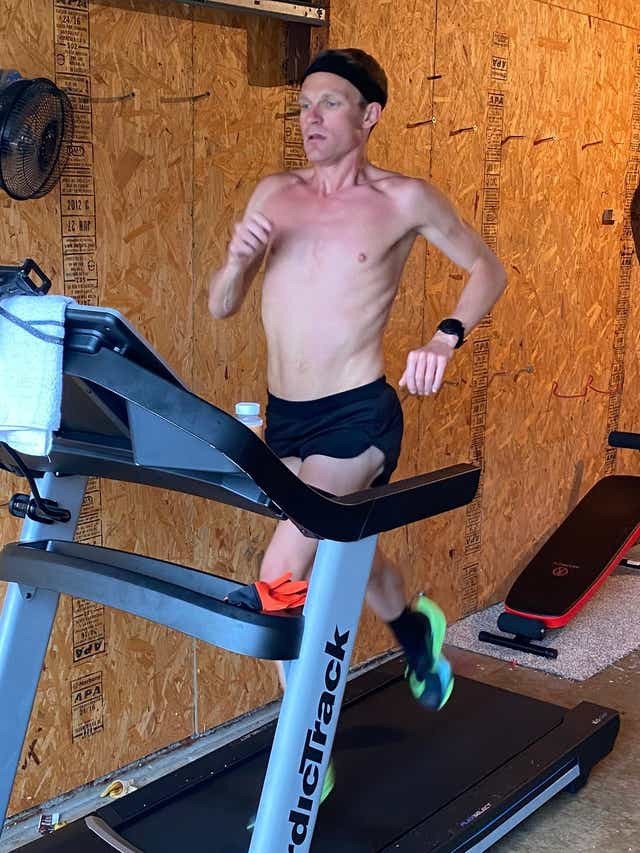
VanEtten announced his plans to run the treadmill 100-miler in January, writing about the record attempt on Instagram. “For years now I have been anti-treadmill,” he wrote. “However, for the sake of longevity in my running career I must utilize one for regular use.” At the time, he said he hoped to run under 12 hours — a goal that he ultimately shattered.
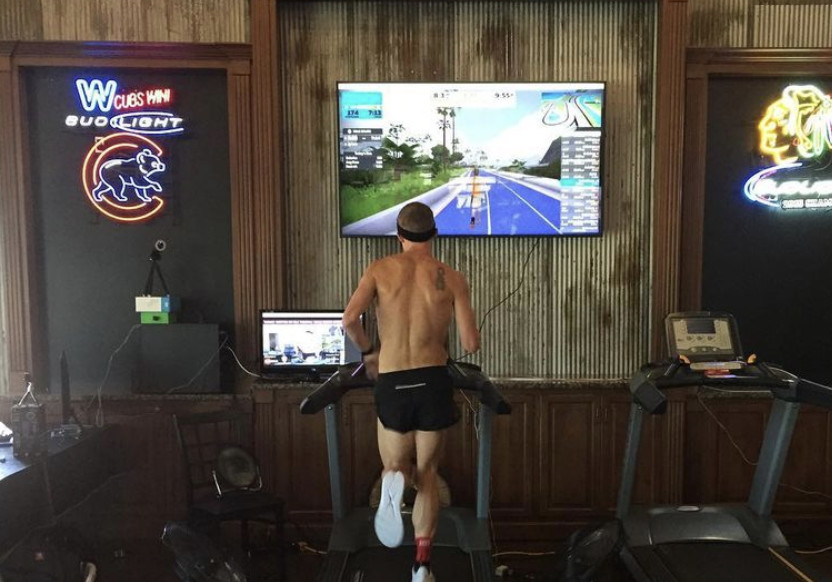
Running on a treadmill in a pub in Morton and keeping track of his progress on Zwift, VanEtten ran an impressively steady pace throughout. For the most part, he hovered between 4:10 and 4:20 per kilometre, and he never ran a kilometre slower than 4:58.
At 116K into the run, he posted one of his slowest kilometres of the day at 4:36, but he immediately made up for it by running 10K at sub-4:10 pace, including three sub-four-minute kilometres. His slowest kilometre of the day came at the 139K mark, but he regained his composure and remained steady in the 4:20s for the rest of the run. For context, his average speed of 4:18 per kilometre works out to a 43-minute 10K. Many people would be happy to run one 10K this quickly, but VanEtten ran 16 in a row at this pace.
To make the feat even more impressive, this record attempt was only VanEtten’s second official ultramarathon event. His first came in November 2020, when he won the Tunnel Hill 100-miler in Illinois. Despite the fact that it was his first ultramarathon ever, VanEtten not only won the race, but he posted the second-fastest result in the event’s history. His 12:19:55 finish was only 11 minutes slower than none other than Bitter, who owns the Tunnel Hill 100 record of 12:08:36.
VanEtten’s still a rookie when it comes to ultrarunning, but based on his two results so far in the sport, it’s safe to say his name is one that fans will get used to hearing in the coming years.
by Ben Snider-McGrath
Login to leave a comment
After about a day of running, medical concerns force Dave Proctor to stop short of TransAlberta FKT
Mid-run medical concerns have forced Dave Proctor to call off his TransAlberta FKT (fastest known time) attempt. Around a day into what he hoped would be a 72-hour run across Alberta, Proctor decided it was in his best interest to get picked up and receive medical attention. He was taken to Foothills Medical Center in Calgary on Saturday, and after a round of tests, he has returned home.
Before his run, Proctor said he hoped to complete the 537K TransAlberta FKT in 72 hours or less. This would set two records, as it would be the fastest run across Proctor’s home province of Alberta and it would better his own Canadian 72-hour record, which currently sits at 500K. Pushing a stroller that contained all of his gear, food and water, Proctor set out on the Trans-Canada Highway on Friday morning, kicking the challenge off at the B.C.-Alberta border.
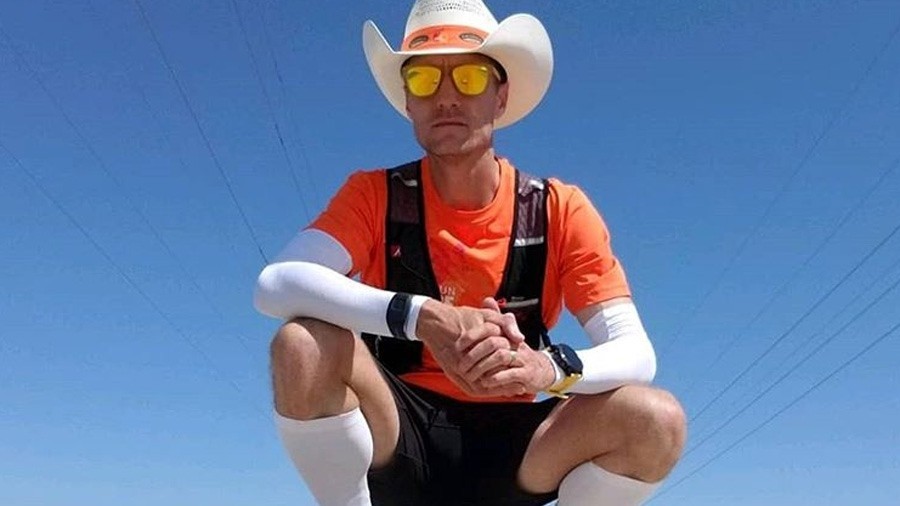
Proctor’s goal for the opening 100 miles of the FKT attempt was to run somewhere between 14 and 16 hours. He hit that with time to spare, passing through 100 miles in 15 hours, 30 minutes. He then continued on through Calgary and powered toward the remaining two thirds of the run. Unfortunately, Proctor didn’t get much farther, and when things didn’t feel right on the other side of Calgary, he decided to call for a ride to take him to the hospital.
Posting on Proctor’s behalf on Instagram, Stephanie Gillis-Paulgaard of Take Roots Consulting wrote, “Dave had to make a very tough call to end his TransAlberta run. He had some concerns and is now being cared for by our amazing healthcare workers. Of course there is disappointment but he’s happy with his effort.”
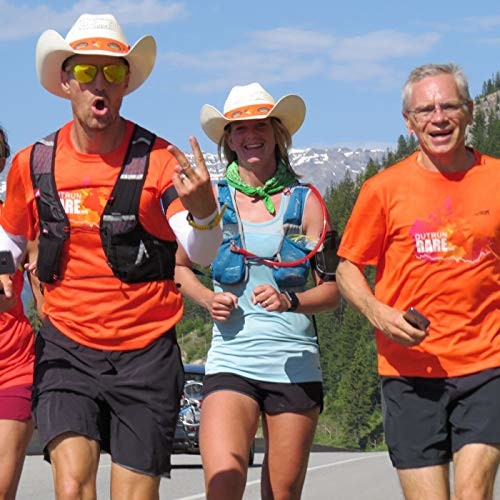
Before his run, Proctor said all he had in his mind as a set goal was to hit the first 100 miles between 14 and 16 hours. After that, he said, it was impossible to know how his body would react to the run. He averaged about 5:47 per-kilometer pace for the opening 100 miles, and he decided that carrying on for another 200 wouldn’t have ended well.
“These decisions are never easy to make,” Gillis-Paulgaard said after Proctor returned home. “When you have concerns — any concerns — you leave it to the professionals.” Gillis-Paulgaard noted that Proctor’s tests at the hospital came back normal, but he’s at peace with the decision he made on the route.
“The reality of completing the TransAlberta in the intended timeframe was not in the cards,” she said. “For now, Dave will rest and assess.”
by Ben Snider-McGrath
Login to leave a comment
Dave Proctor set to start TransAlberta run on Friday, he hopes to finish in 72 hours, and fans can track him the whole way
Canada’s Dave Proctor will start his TransAlberta FKT (fastest known time) attempt on Friday at 9 a.m. MDT, kicking the challenge off at the Alberta-B.C. border. He’ll follow the Trans-Canada Highway all the way across Alberta for 537K before reaching the border with Saskatchewan. Proctor hopes to complete this run in 72 hours or less, which would set the TransAlberta FKT and break his own national 72-hour record of 500K. The run starts Friday morning, and anyone interested in following along can track Proctor’s progress.
Proctor has had multiple Canadian and world records to his name, and he is the current national record holder over 24, 48 and 72 hours. His original plans for this spring involved running across the entire country in an attempt to set a cross-Canada speed record. He had actually hoped to complete that run in May 2020, but the pandemic forced him to postpone. Those plans have been put off once again due to COVID-19, but Proctor didn’t want to let his fitness go to waste.
Certain province-to-province travel might not be allowed right now, but Proctor is free to run within Alberta’s own borders, so he decided to shift his focus to a shorter but still gruelling challenge. While he hoped to complete his cross-Canada run in around 67 days (which would beat Al Howie‘s 1991 record of 72 days on the 7,200-kilometre route), Proctor will now look to run across Alberta in three days or less.
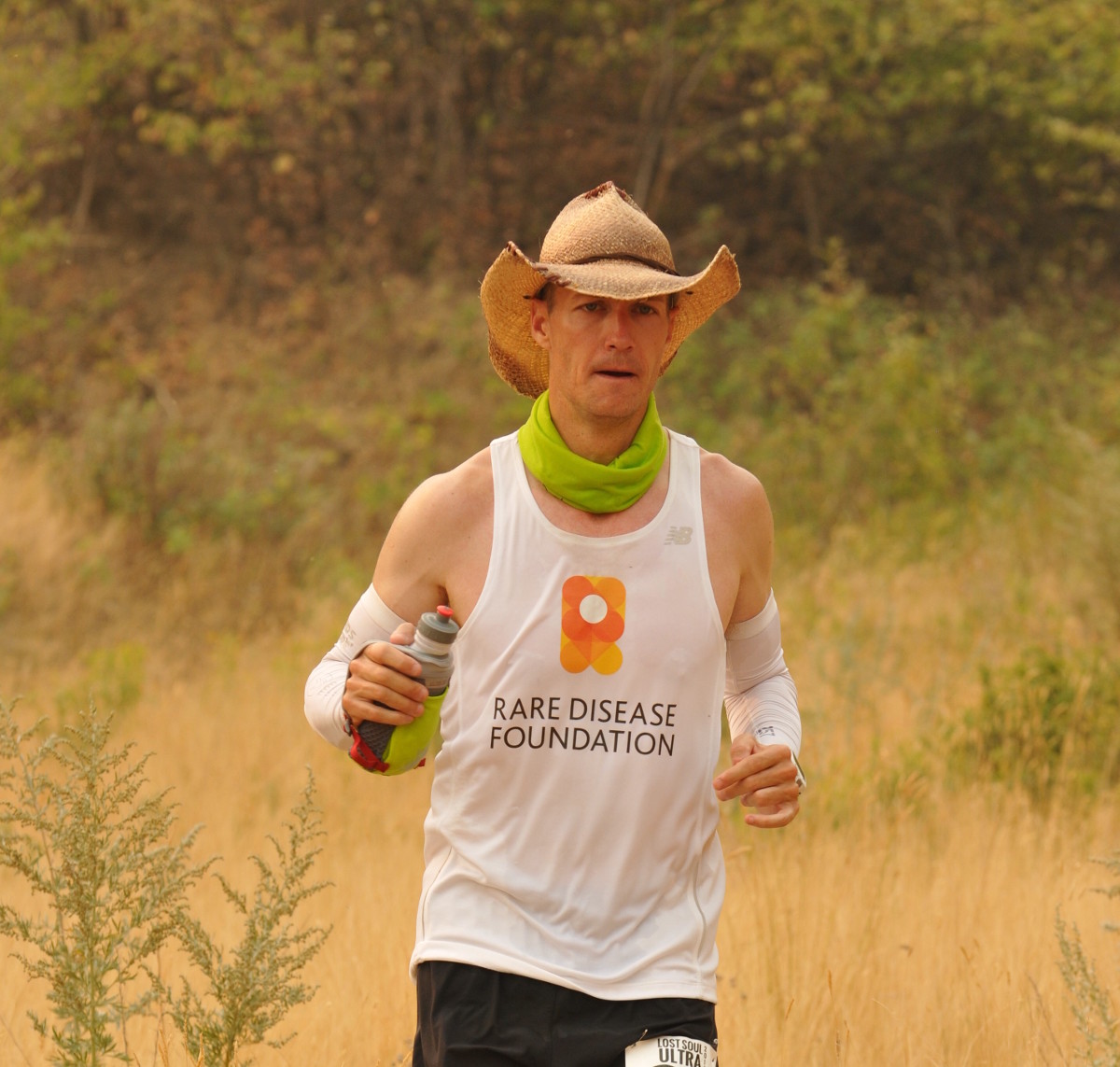
“I have all this fitness, and I wanted to put it to the test,” Proctor said after announcing his run. “I wanted to go out and test myself with something really, really hard.”
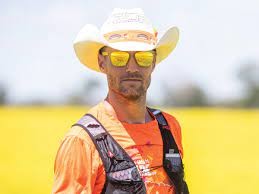
The coast-to-coast run would have been supported, but Proctor will be all alone during the TransAlberta FKT, pushing his food, water and other supplies in a stroller.
kilometer“After 200 miles, I can’t really say what the pacing strategy will be,” he said. “From there, it’s just a sustained effort and I have to hold on for dear life and pray that I make it in time.” More and more races are cropping up around the world after so few events last year, but the total is still far from where it was before the pandemic.
Proctor’s run isn’t an official race, but it is a chance for fans of the sport to watch something exciting and special. Follow his progress on the route here (his dot and route won’t appear on the map until he starts running) and check out his Instagram page for updates over the weekend.
by Ben Snider-McGrath
Login to leave a comment
Training for the mental side of ultramarathons
Dave Proctor finished the Great Virtual Race Across Tennessee (GVRAT) 2,000K route on June 11, although he should have been partway through his cross-Canada speed record attempt. He was forced to cancel the cross-country run when COVID-19 hit, but he still plans to go for the record (which is 72 days and 10 hours, set by Al Howie in 1991) next year. Proctor’s body is used to taking a beating on long runs, but his mental game also plays a huge role in his success as an ultrarunner. Canadian Running spoke with him about the GVRAT, the run across Canada and how he trains his mind for such gruelling events.
Tuck the past away
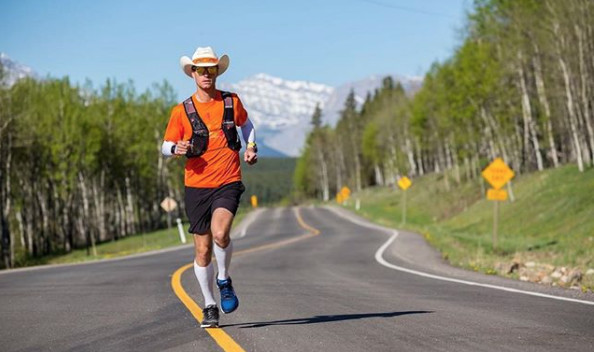
Proctor is well known in the Canadian ultrarunning community. He has run treadmill world records, he’s organized races and he is consistently among the top athletes at any event he runs. He’s used to running long distances, and he finished the GVRAT after 42 days of running. For his cross-Canada run, he planned on running 105K each day, which would have gotten him across the 7,200K route in 67 days. Running can be hard for him, too, but it’s how he deals with those tough times that makes him a great runner.
“Everyone gets tired after an hour of running,” he says. “If you automatically think, ‘OK, I have 12 more hours of this,’ then you’re going to crumble.” Instead, Proctor says to “tuck the past away,” not to worry about the future and to “focus on right now.” He says there are too many factors out of your control, and to worry about them will just hurt your psyche.
“A storm might blow in at any moment during a race,” he says. Deal with that when it comes your way, but in the meantime, he says to embrace the “mindlessness of living in the moment. There’s that big component of being in the now.”
The difficulty plateau
Proctor admits that it’s not always easy to live in the moment, but he says he gets to a certain point when he knows things won’t get any worse. When this happens, he asks himself, “’Are you OK with staying here for a while?’ If the answer is yes, then I know I’m good to keep going.” He continues to check in with himself throughout these long runs, and as long as he knows he can physically keep moving, he pushes forward.
Go in with a plan
Whether you’re running a 100-miler or aiming to run 100K every day for weeks like Proctor as he crosses Canada, he says having a set plan is important. “Go in with a plan,” he says. “A lot of the time, your ego, fear or other things will take you away from that plan. There will be days when I want to run an extra 20K, but physiologically that can mess you up.” Having a set plan for pacing or nutrition or how much you’ll run each day will ease your mind. Just be sure to stick with it.
Cut yourself some slack
“Take what your body gives you,” Proctor says. “We’ve all woken up on the right side of the bed and we’ve all woken up on the wrong side, too.” He says it’s important to accept those tough days and to “be kind to yourself” and realize that day won’t be your best. Freeing yourself from your pre-run expectations can take a mental load off and help you push through those tough times.
by Running Magazine
Login to leave a comment
American ultra runner Zach Bitter breaks 100-mile treadmill world record clockin 12:09:15
American ultra runner Zach Bitter spent all day Saturday on the treadmill, starting at 6:30 a.m. PST and running until just after 6:30 p.m.
He ran for 100 miles (160.9K) and set the new treadmill world record for the distance with a time of 12:09:15. He bettered Canadian Dave Proctor‘s previous record (set at last year’s Calgary Marathon expo) of 12:32:26 by over 20 minutes. Bitter averaged an incredible 4:32 per kilometer over 12 hours and 100 miles of running.
Bitter’s average pace of 4:32 per kilometer would have given him a 3:11 marathon, which is a good time on its own, but he ran almost four marathons in a row on Saturday. The run was streamed live on YouTube, and different ultra runners and endurance athletes Zoomed in to chat as Bitter chipped away at his 100-mile trek.
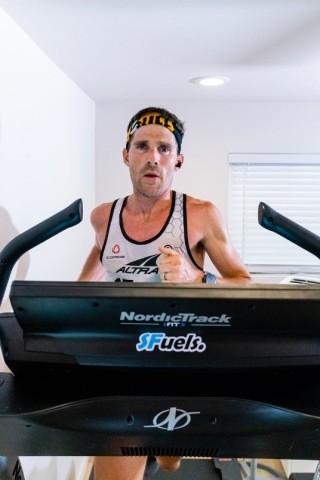
Some of those big names included 2019 Ultra-Trail du Mont-Blanc winner Courtney Dauwalter, Aravaipa Running’s Jamil Coury, Quarantine Backyard Ultra champion Mike Wardian and Proctor himself, who knows exactly what it takes to break the 100-mile treadmill record.
Bitter is already the world record-holder in the 100-mile run, which he set last August at an indoor track in Wisconsin in a time of 11:19:13. He is also the owner of the 100-mile trail record from the 2018 Tunnel Hill trail race in Illinois, where he ran 12:08:36.
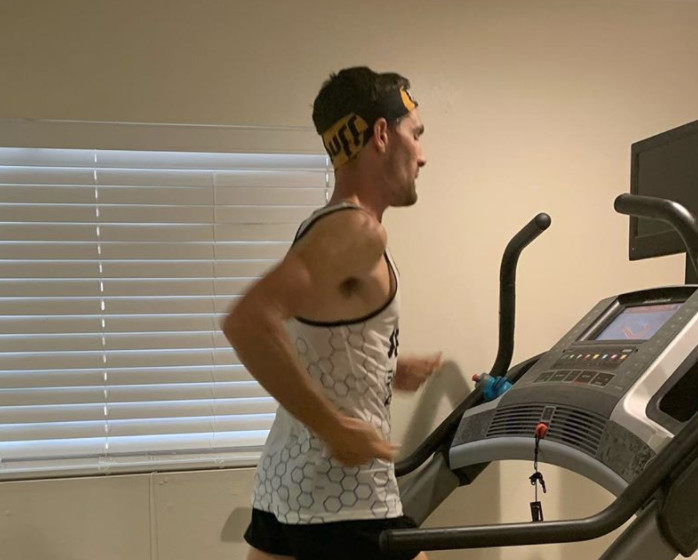
Now, he has officially added the treadmill record to his resume. With these three records to his name, it’s fair to say that Bitter is in the conversation for greatest 100-mile runner of all time, if not the outright winner of that title.
Bitter has been running ultra marathons for a decade now, and he’s got plenty of big race wins and results to his name.
He was 11th at the 2018 Western States 100, he took 32nd place at the 2016 Comrades Marathon and sixth at the International Association of Ultra runners 100K world championships in 2014. In 2019, he won three races, including the San Diego 100-miler in California.
by Ben Snider-McGrath
Login to leave a comment
Mike Huber runs for 25 hours in virtual marathon and he was one of 2,400 runners from 64 countries
Mike Huber was supposed to travel to Calgary in June to run an ultra-marathon in support of The Rare Disease Foundation.
Then along came COVID-19. The world was turned upside down and the marathon, like all other events across the globe, was cancelled.
However, the die-hard running community didn’t hang up their bibs. Instead they went the extra mile.
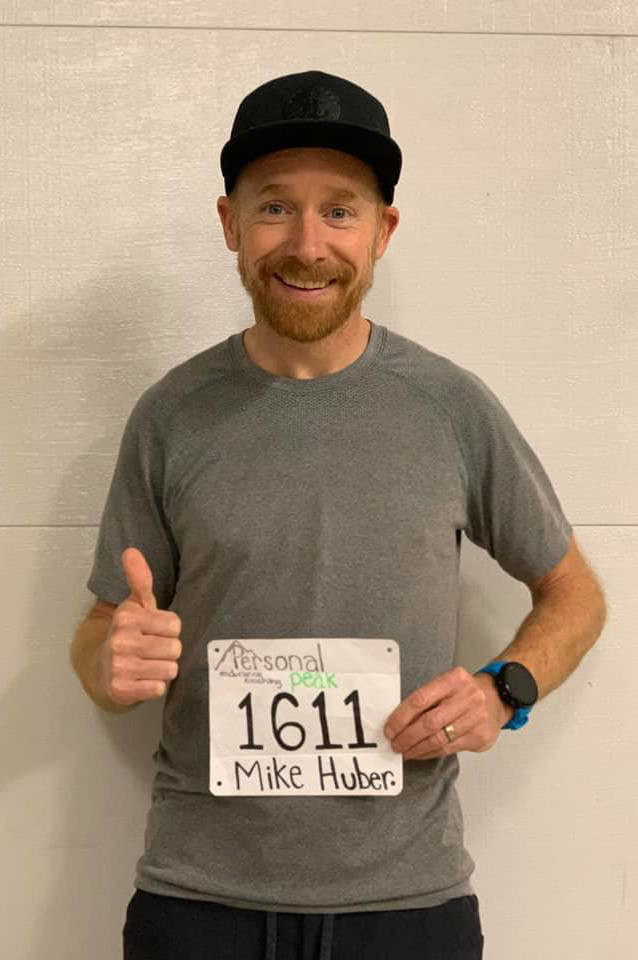
Huber along with 2,400 runners from 64 countries from around the world, took part in the first annual Quarantine Backyard Ultra – the brainchild of Albertan ultra-marathon runner Dave Proctor and a company called Peak Run Performance.
Every runner around the world started the race at the exact same time at their own home – either on a treadmill or on the road.
They had to run a 6.7 kilometer loop every hour, starting again at the beginning of every hour, until they could no longer run anymore.
If an athlete finished the loop early within the hour they got to rest for the remaining time before setting out on the next loop. However, if a participant did not finish the loop within the allotted time, they were eliminated.
“That’s the game,” said Huber.
“It’s how much time do you have to rest versus not rest,” he said.
The strategy depends on the runner. Some people like more rest, explained Huber, and some people like less so they keep moving and their body doesn’t seize up. And then you have to eat.
A two minute warning would alert athletes get on their start line and if a runner failed to start at the exact time then they were disqualified.
Times were logged on an app called Strava through the athlete’s watches.
Runners also used the teleconferencing app called Zoom to allow them to interact with other racers and live feed while running.
“What makes the race really unique, and we joke about it in the running world, there’s only one winner,” said Huber.
Huber started his race at 6 a.m. PST on Saturday, April 4, and finished at 7 a.m. on Sunday.
by Collen Flanagan
Login to leave a comment
After over 50 hours ultrarunner Mike Wardian runs 63 laps for 422K to win the virtual race Quarantine Backyard Ultra
The Quarantine Backyard Ultra started Saturday morning, and over 2,400 runners from more than 50 countries joined the virtual race. Runners ran 6.706K every hour for as long as they could, and over 60 hours later, only two runners remained: American Mike Wardian and Radek Brunner of the Czech Republic. Brunner missed the start of the 63rd lap and was therefore disqualified, making Wardian the winner after 422K.
With every passing lap of the Quarantine Backyard Ultra, more and more of the world’s best ultrarunners dropped out and registered DNFs. Last year at the Big’s Backyard Ultra, Maggie Guterl ran 60 laps for 402K, but a nagging back injury forced her to pull out of the race this weekend after just nine laps.
After 15 laps and 100K, Jamil Coury called it a day. Three laps later, Canadian Cal Neff dropped out. At the 100-mile mark, Courtney Dauwalter threw in the towel, along with 72-year-old Gene Dykes. Later on, after 31 laps, Canadian Dave Proctor (who helped bring the event into fruition), had to end his race due to back pain.
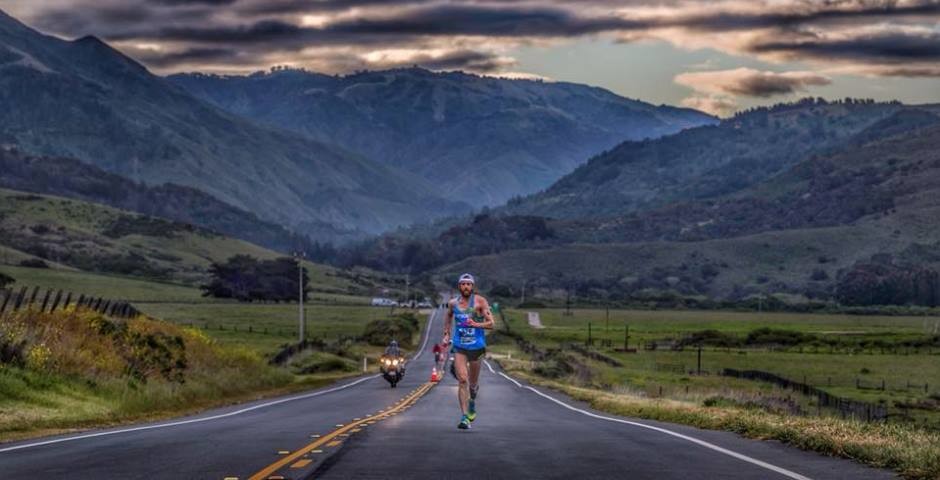
“It was a bit of a tough day for sure,” Coury said. “I was hoping to go as long as I could— 24 or 30 hours—but you never know with these things.” Although he didn’t get as far as he would’ve liked, Coury cut himself some slack, seeing as he’d run a marathon around a 27-metre course just four days earlier. In fact, just making it in time to race at all was an accomplishment for Coury, who slept at his office the night before and woke up only minutes before the event began.
“I was working late on Friday night, and i fell asleep at my office,” he said. “I fortunately had a pair of shoes and socks in my truck. I threw it on, started my livestream and just ran out the door.” Coury ran the first seven hours around his office’s neighbourhood, returning to finish work between laps. He eventually drove home (he made it to his treadmill with three minutes to spare before the start of the next lap) and made it to 100K before bowing out.
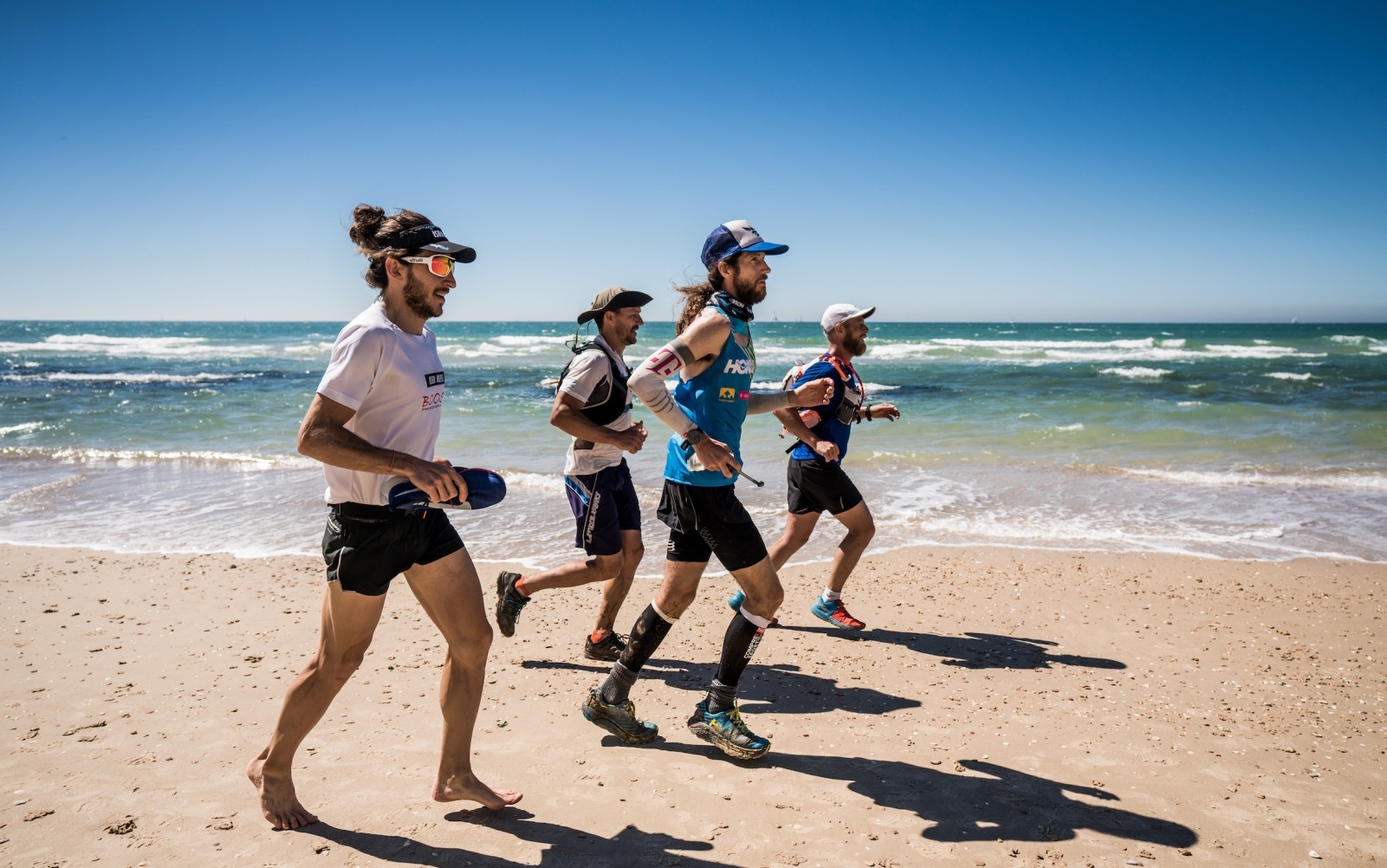
Dauwalter said she got to the 100-mile mark and decided that was “a solid day.”
“When I signed up I didn’t have major plans,” she said. “I wanted to make it at through the night, because that’s always special and fun to see the sunrise.” She did make it through the night, got her sunrise and retired from the race soon after.
“I think this is a really fun format,” she said. “It’s great with the camaraderie. You come back from a lap and go on the Zoom chat with the other runners.” Proctor also noted how fun it was to chat on the Zoom and YouTube feeds.
“It’s so unique,” he said. “When all the runners go off and do their thing, I get extraordinarily busy talking to everybody on YouTube.” He said that he spent around half of his time on the treadmill answering questions viewers had posted on the YouTube live video.
“I found that it was really quite rewarding. It gets your mind off of what you’re doing and it gives you something [else] to do.” While they were both still in the race, Proctor and Coury teamed up and answered questions together, adding some fun banter to the mix as well.
The two finalists had very different setups for the final laps. Brunner ran solo in his house on a treadmill while Wardian took to the streets with a support crew and several cyclists riding alongside him as he ran. The winner of multiple U.S. national titles at ultra distances, Wardian is well known in the running community. He has run the Western States 100 and the Ultra-Trail Du Mont-Blanc multiple times, and he finished 11th at the 2011 Comrades Marathon and third at the 2010 Marathon des Sables.
Brunner is more of an unknown, at least in the North American ultra community, but like Wardian, he has an impressive running resume. He has represented the Czech Republic on multiple occasions, competing at the 24-hour, 100K and trail world championships. At the 2017 24-hour worlds in Ireland, Brunner came 14th. He has also run to the podium four years in a row in the Spartathlon, a 246-kilometre ultramarathon in Greece. Although he didn’t win, after this run, Brunner’s name has become much more well known in the ultrarunning community.
by Ben Snider-McGrath
Login to leave a comment
The Quarantine Backyard Ultra is a chance to race virtually for free this spring
If you’re itching to race this spring but don’t know where to turn, maybe just look to your backyard. The Quarantine Backyard Ultra is a free race that anyone can enter, and you can do it from the comfort of your own home or on a route nearby. Canadian ultrarunner and treadmill-running world record-holder Dave Proctor will be running the Backyard Ultra, which will be broadcast on YouTube starting on April 4, and the Barkley Marathons‘ Laz Lake will be the honorary race director.
The race starts at 6 a.m. PT on April 4. All runners will connect via Zoom video call, and this is where their progress will be monitored. Athletes can choose between running on a treadmill or on a route that starts and finishes at their home. Runners who choose the former option must point their camera at their treadmill after they complete each lap to prove they completed the distance (each lap is 6.706K).
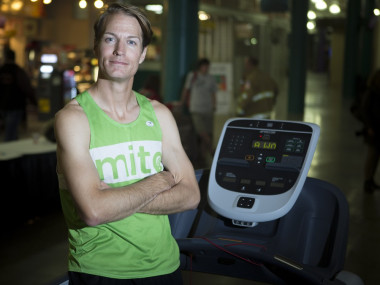
Racers who opt to run outside must use a GPS watch or smartphone to record their distance run, and at the end of each lap, they must show proof of the completed lap to the Zoom audience. Once runners complete each lap, they can relax until the next lap begins. The last person running is the winner.
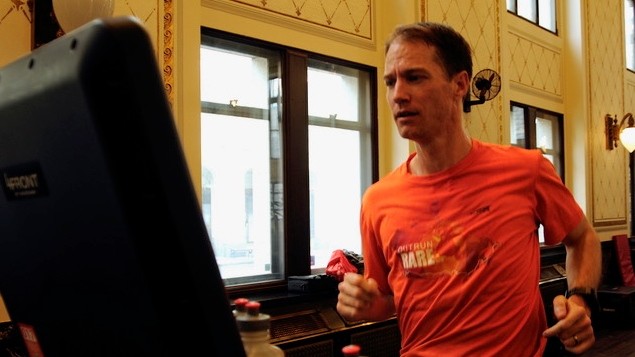
The race will be live streamed on YouTube, which should satisfy many running fans’ needs for live racing. Better yet, the event will have live updates on its Facebook page written by Lake, and, if all goes well with Zoom, Lake will also provide colour commentary over the live feed as well. Last year, Lake travelled to Calgary and acted as the honorary race director for Proctor’s Outrun Backyard Ultra, which was modelled after Lake’s Big’s Backyard Ultra in Tennessee.
The race is being organized by Personal Peak, an endurance coaching company witch which Proctor works. In May, Proctor was set to tackle the TransCanadian speed record attempt, and Personal Peak coaches were going to be his crew for the run. When he had to postpone his attempt, Proctor decided he had to do something to replace it.
“His fitness level wasn’t going to go to waste,” says Stephanie Gillis-Paulgaard, Proctor’s publicist. “Dave’s a competitor, so we said, ‘Let’s see who else we can get on board.'” So, Personal Peak set the race up and they “extended that invitation to all of the best ultrarunners,” Gillis-Paulgaard says. As it stands now, 11 other elite runners have confirmed for the April 4 race, but Gillis-Paulgaard, Proctor and the Personal Peak team hope to attract runners of all levels.
“Hopefully, for those people who have trained over the winter months, this will give them something to race, whether they run one lap or 50,” Gillis-Paulgaard says. The winner of the event will win what is, according to the race website, “soon to be world’s most coveted prize: The Golden Toilet Paper Roll.” In a time where race opportunities are sparse and toilet paper is hard to come by, you can get both in the newest virtual race.
by Ben Snider-McGrath
Login to leave a comment
Canadian record-holder Dave Proctor announces a second cross-Canada speed record attempt starting May 18, 2020
Canadian and world record-holding ultrarunner Dave Proctor, whose 2018 cross-Canada speed record attempt was thwarted by injury after 2,415 kilometres, has announced he will try again next year, starting on May 18. This time Proctor will run from east to west, starting in Newfoundland and finishing in Victoria, with the goal of completing the quest in 67 days. The current record, held since 1991 by the late Al Howie of Victoria, is 72 days, 10 hours.
Inspired by his experience as the father of a child with a rare genetic disease (his son Sam, 10, has RECA, which stands for relapsing encephalopathy with cerebellar ataxia), Proctor raised more than $300,000 from his runs for the Rare Disease Foundation last year. His latest accomplishment was two world records in treadmill running, set at the Calgary Marathon expo in May: the 12-hour and the 100-mile, which he set at 153.8K and 12:32:26. Proctor holds the Canadian records for 24 hours and 48 hours on the road.
“I’m ready to take this on and I’ve got so much more in the tank this time,” says Proctor. “My bodyhas recovered, and I am fitter than ever before, with more passion about our cause fueling me and the hundreds of communities supporting the run.”
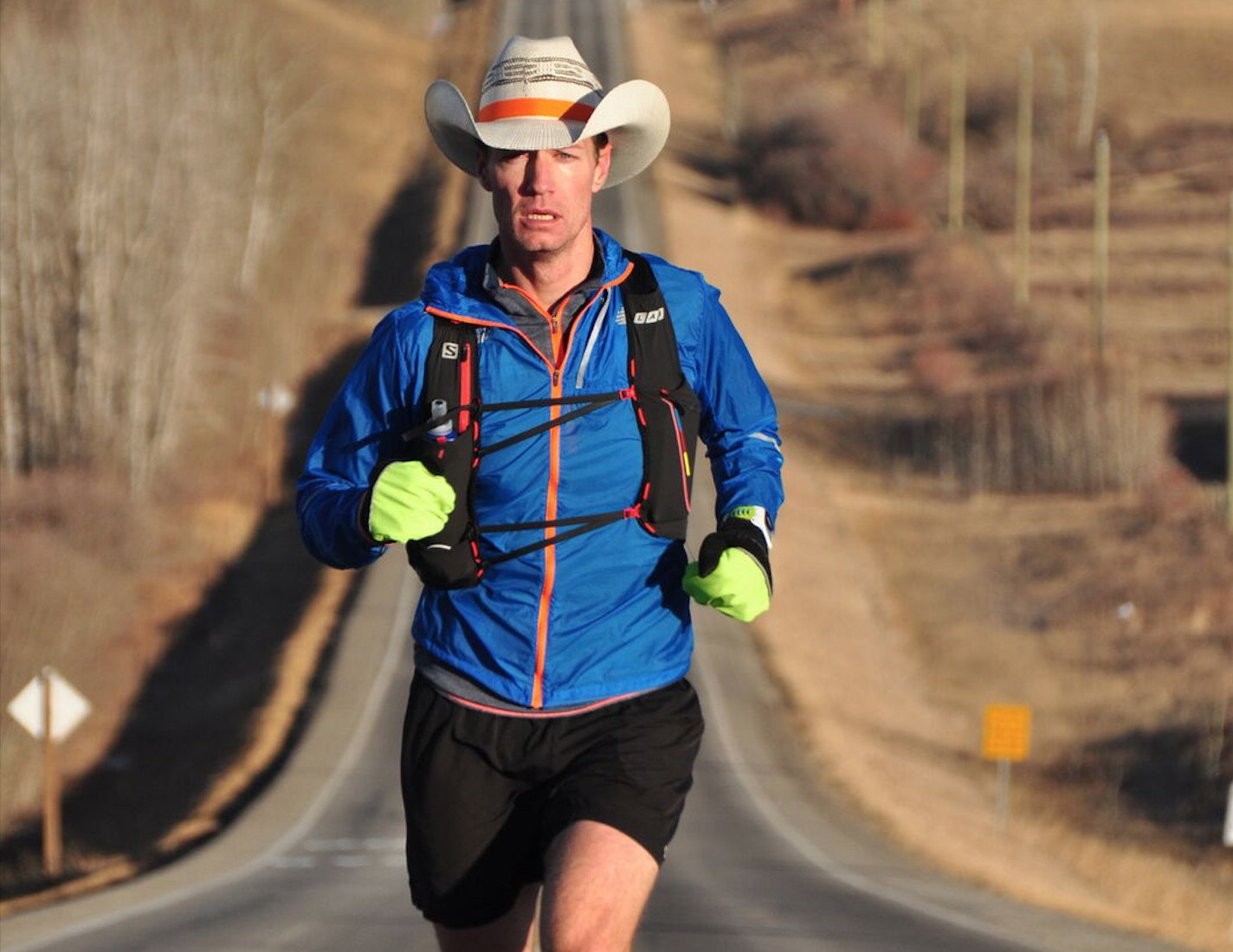
The announcement comes on the heels of the publication of the first biography of Howie, by Jared Beasley, who stumbled upon his story in 2014 after meeting and befriending one of Howie’s competitors from the 1980s. The two men belonged to a small subset of ultrarunners who ran mind-boggling distances in the multi-day races of the 1980s and 90s, which have almost completely disappeared.
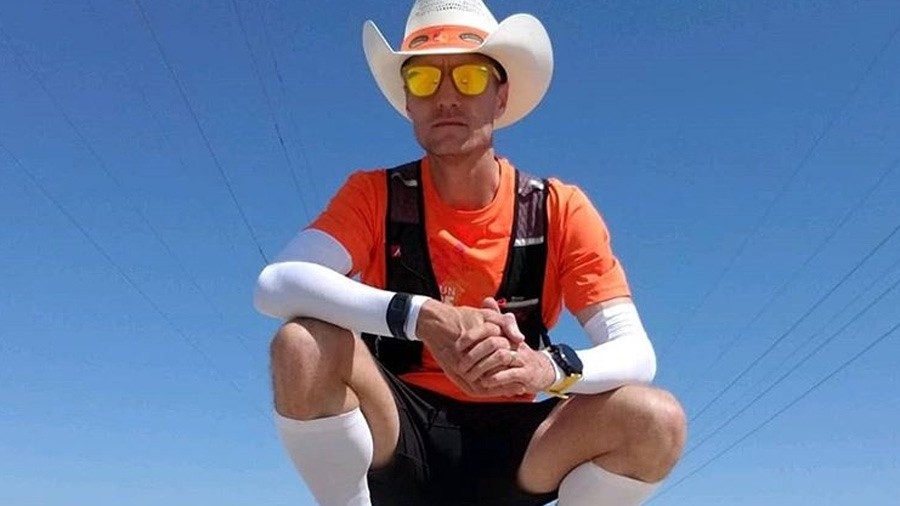
Howie was an eccentric and a loner with a complicated personal history, who mostly lived in poverty.
His habit was to start races at a blistering pace, creating a huge lead for himself before settling into a slower, more sustainable pace that he could maintain for days at a time. He met Terry Fox and Rick Hanson at the run that inspired Fox’s Marathon of Hope (the Prince George to Boston Marathon of 1979, in which Howie finished third). Howie was 46 when he set the cross-Canada speed record, and two weeks after completing the run, he broke his own course record at the Sri Chinmoy 1,300-mile race in New York.
Proctor will have to cover 105 kilometres, or the equivalent of two and a half marathons a day, to achieve his goal, which is to break Howie’s record by five days.
Proctor recently broke his own 48-hour record (unofficially) at the Six Days in the Dome event in Wisconsin, at which American ultrarunner Zach Bitter broke the world 100-mile record. Proctor is now looking ahead to Laz Lake’s Big’s Backyard Ultra, which starts on October 19 in Tennessee.
by Anne Francis
Login to leave a comment
Ultrarunner cross-Canada speed record quest was cut short due to a back injury
Login to leave a comment
After 11 straight days on the road, ultrarunner Dave Proctor and his support crew arrived in Calgary Monday
Login to leave a comment
Canada’s Dave Proctor runs 358K in 48 hours
Login to leave a comment


